Beyond the farm gate
Making your land work for you






“I do not sit in the shadow of those who farmed before me”
Start your engines
From the race track to the farmyard


Naomi Williams-Roberts on diversification





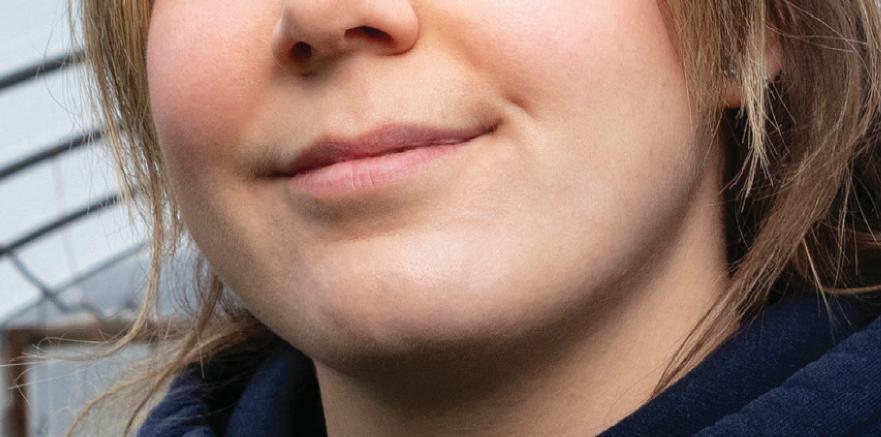
Dementia and farming
One family's experience with dementia



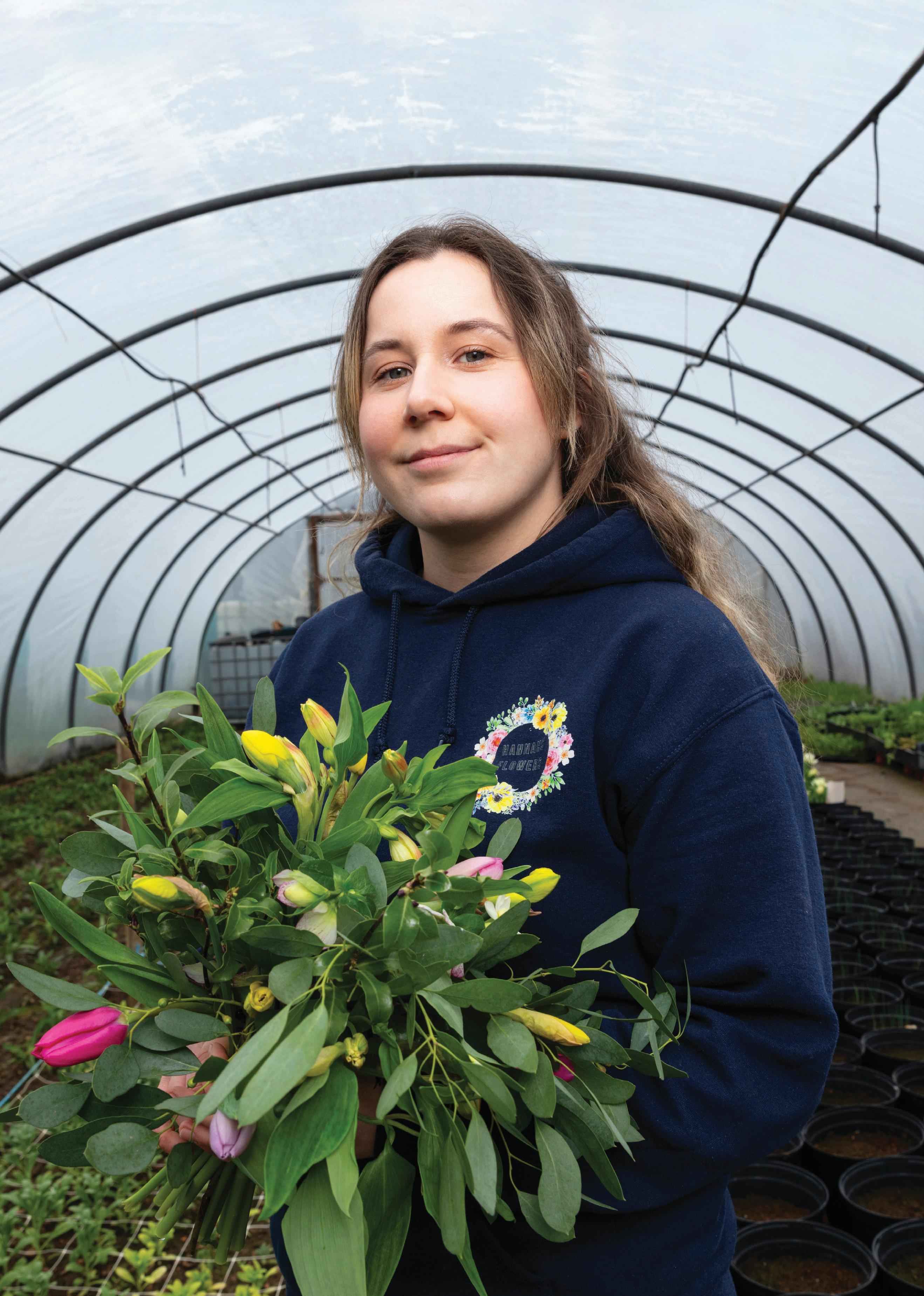





to level up your TikTok game

Hannah's venture into British cut flowers is blooming #NFU24 Behind the scenes at NFU Conference


May 2024 Grow your business
Why
need to increase awareness in agriculture
NEURODIVERSITY
we

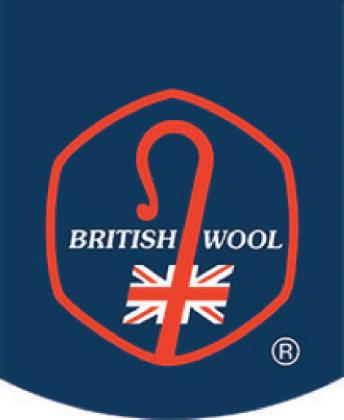






May 2024 2 @britishwoolfarm @britishwoolfarm @britishwoolfarm
PUBLISHED BY:
NFU, Agriculture House, Stoneleigh Park, Stoneleigh, Warwickshire, CV8 2TZ
EDITOR:
Beth Wright beth.wright@nfu.org.uk
WORDS BY:
Beth Wright, Rhys Felton, Sophie Bird, Rupert Shinner, Naomi Williams-Roberts, Sian Grove, Jon Watt, Megan Morgan, Molly Mead, and Madeleine Sweet
DESIGNED BY:
John Cottle
COVER
TO ADVERTISE, CONTACT: Alan Brown alan.brown@nfu.org.uk
Scott Keyes scott.keyes@nfu.org.uk




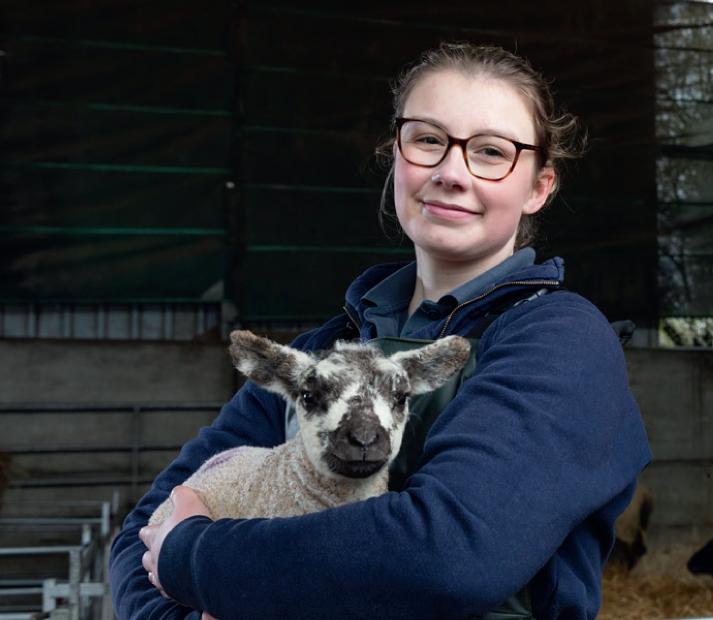
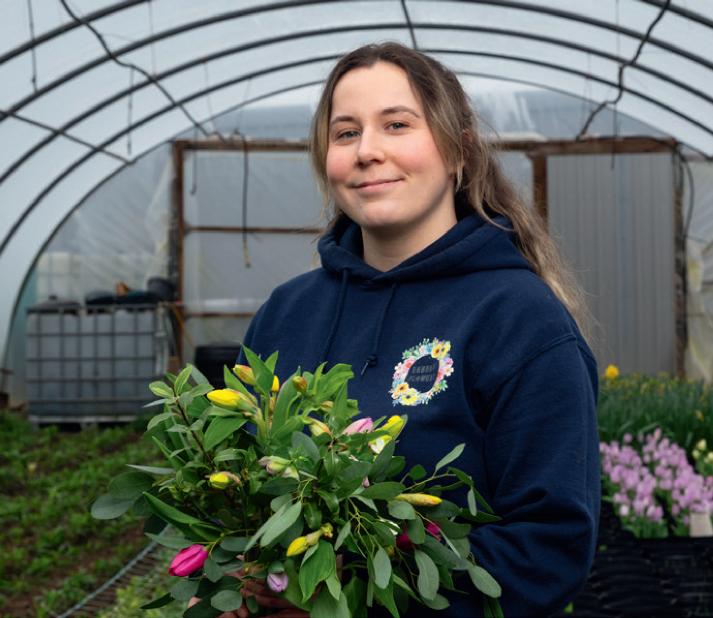
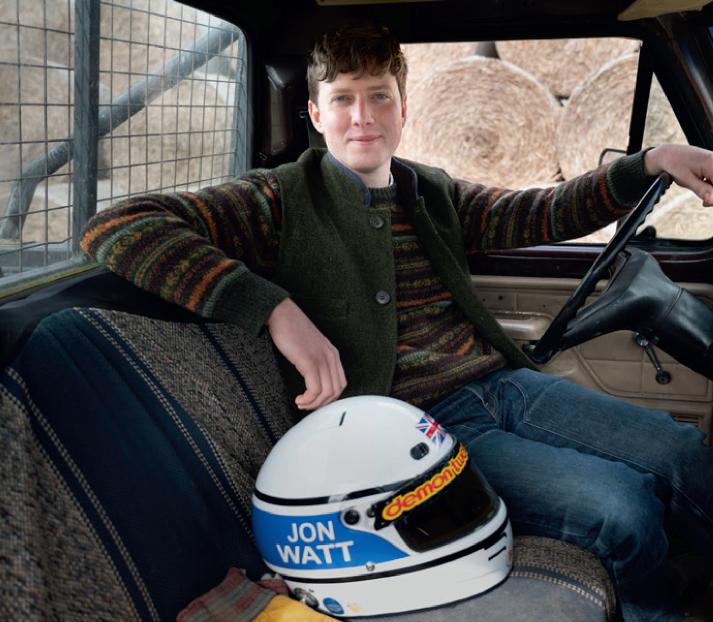

Molly
One
Catch
A
Q&A with Student Advisory
A time for change
The lambs are in the fields, the da odils have bloomed, and the Easter chocolate has long been eaten. It’s spring, and I hope you’re taking in the joys of it where able after what has been a pretty dismal start to the year for many, weather-wise. I do hope you have been able to grab a well-deserved cuppa after a tough stint in the lambing shed or make the time to take a break and catch up with friends and family around the kitchen table.
This edition we’re going beyond the farm gate, in all senses of the phrase, from visiting young people on farm to explore their diversification journeys, to learning about how they’re doubling down on making their land work for them.
Elsewhere, Student & Young Farmer Ambassador Molly Mead shares her story in a bid to raise awareness of neurodiversity in the agriculture sector and among the farming community, while young farmer Megan Morgan speaks out about the impact of dementia on her family and explains why succession planning and being open with your mental health is so important.
We also look back on NFU Conference, our first year on TikTok, and the new Institute for Agriculture and Horticulture (TIAH), which could help you to launch or further your career in agriculture.
As the days continue to get longer, the sun (hopefully) starts to make more of an appearance, and we begin to look forward to summer, I wish you a safe and happy few months ahead – and my inbox is always open should you have a story to share.
Beth Wright, Editor, Student Farmer
Contents
BY:
IMAGE
John Cottle
04 BEYOND THE FARM GATE One family's diversification journey 08 NOT A BAA-D IDEA Innovating with fleece 10 IN HER OWN WORDS
shares her neurodiversity
to raise awareness 14 DEMENTIA AND FARMING
journey
family's experience with dementia 17 OUR MAN IN JAPAN
up with Rupert 19 FLOWER POWER Hannah's venture into cut flowers 24 NFU CONFERENCE Behind the scenes at #NFU2024 28 START YOUR ENGINES Jon's journey
the race track back to the farm 32 THINGS TO DO... 34 TAKING ON TIKTOK The NFU’s TikTok journey so far 35 PUTTING DOWN ROOTS
from
look at The Institute for Agriculture and Horticulture toolkit 37 ENVIROCROPS
Member
Rowe FOLLOW US: /StudentFarmer @studentfarmer @studentfarmer Read all past editions of Student Farmer at: issuu.com/studentfarmer 10 28 19 May 2024 3
Will
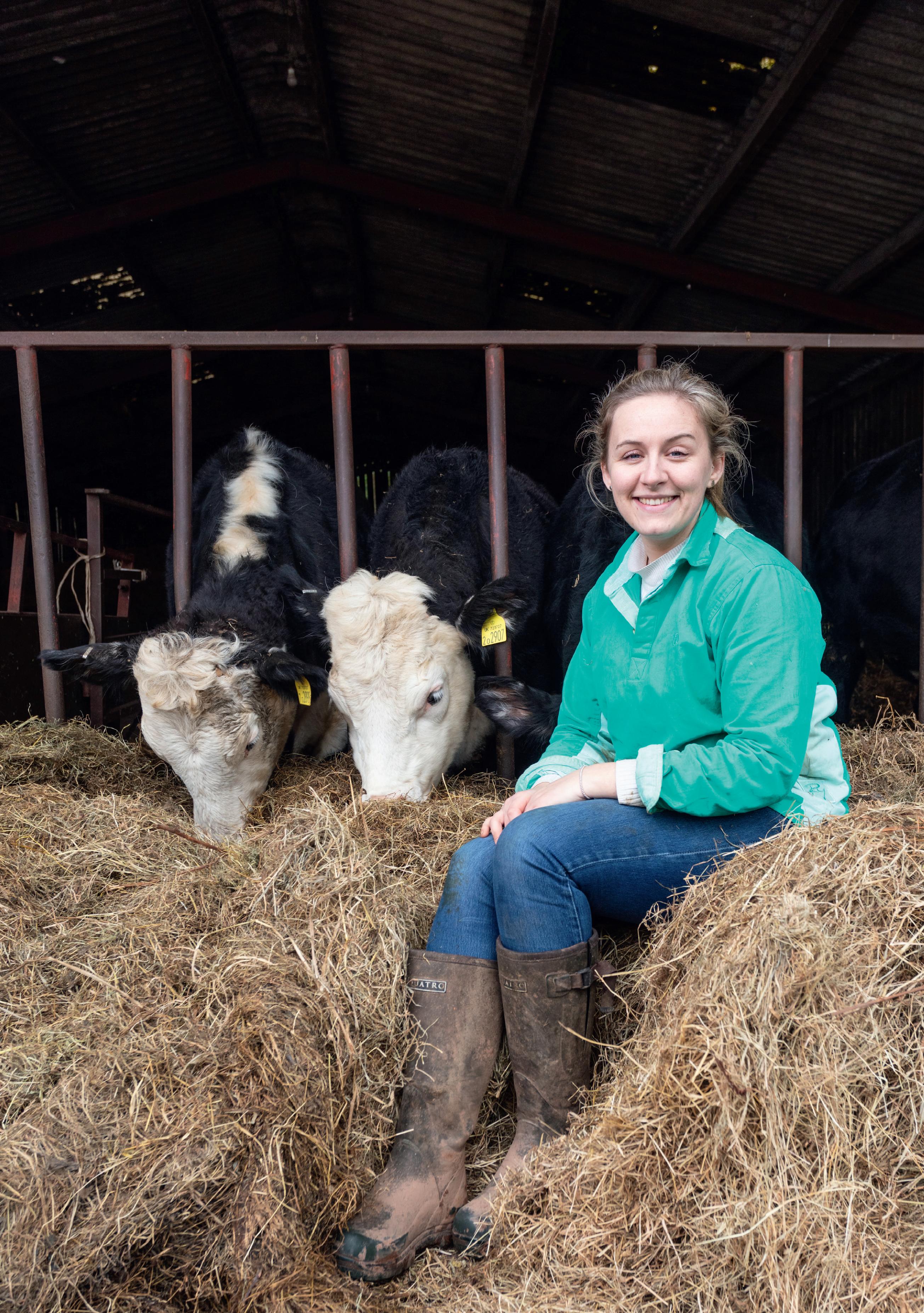
Beyond the farm gate
NFU Cymru Student & Young Farmer Ambassador
Naomi Williams-Roberts shares her diversifcation journey and takes us beyond the farm gate
Naomi Williams-Roberts
COVER STORY
May 2024 4
John Cottle
Ioften get asked how I manage to do so much – working full-time, alongside my husband, we run a tenanted farm consisting of sheep, cattle, and pigs.
On the side I run an Etsy shop, agri-tourism events and sell meat from the farm gate. I used to milk, work part-time at a local market, and teach adult education in the evenings. Most importantly, raising our four-year-old, who if she has her way, will either follow in our farming footsteps or become a country music star.
I have always been a frm believer that variety is the spice of life. Let’s be honest, that’s one of the reasons that farming appeals to so many. It’s not often that two days are the same. To me, farming is the ultimate in multi-tasking and it’s that belief that has set me on the path to diversifcation. For many people this work inspires fear. Diversifying from conventional farming can be scary.
“I have always been a firm believer that variety is the spice of life. Let’s be honest, that’s one of the reasons that farming appeals to so many. It’s not often that two days are the same”
I have not been fortunate enough to come from a farming background, destined to take over a family enterprise. However, it’s aforded me the beneft of not being set on someone else’s path. My opinions are my own, not defned by my father. I also do not sit in the shadow of those who farmed before me.
Being a frst-generation tenant farmer allows many freedoms, but every coin has two sides.
Starting from scratch, there are certain things that are required in order to farm. We started with sheep. These seemed the most cost efective, low investment entry point. Plus, as a new entrant who didn’t know very much about farming at the time, they seemed the most manageable for me physically.
As our enterprise grew, so did our equipment wish list. At this point everything on the farm was being funded by our wages, while we established a fock sizeable enough to wash its own face.
Then, while on maternity leave, away from my ofce job and craving something that wasn’t bottles and nappies, I started researching how to sell our lamb of farm. We had around 80 sheep and wanted to
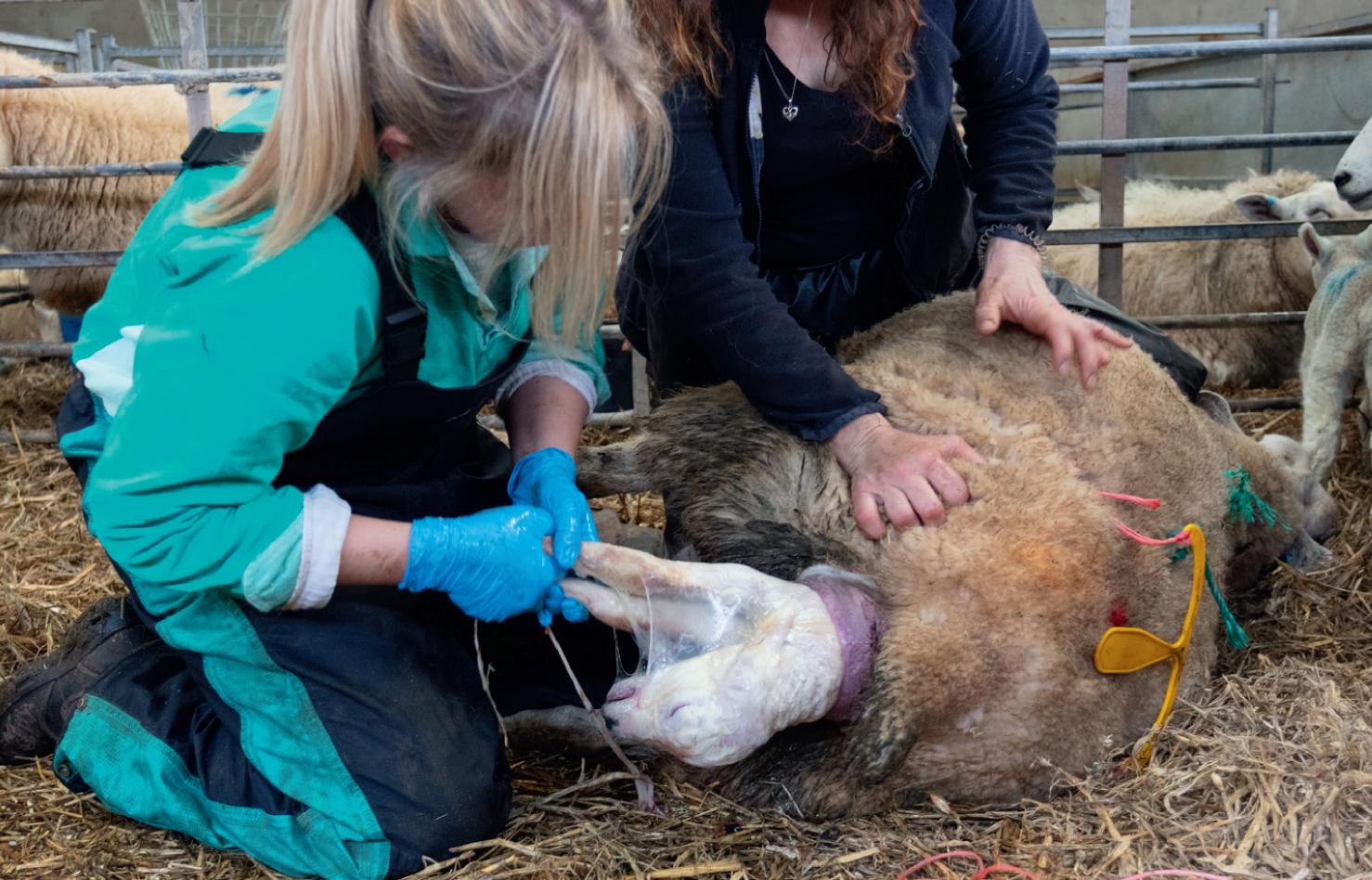
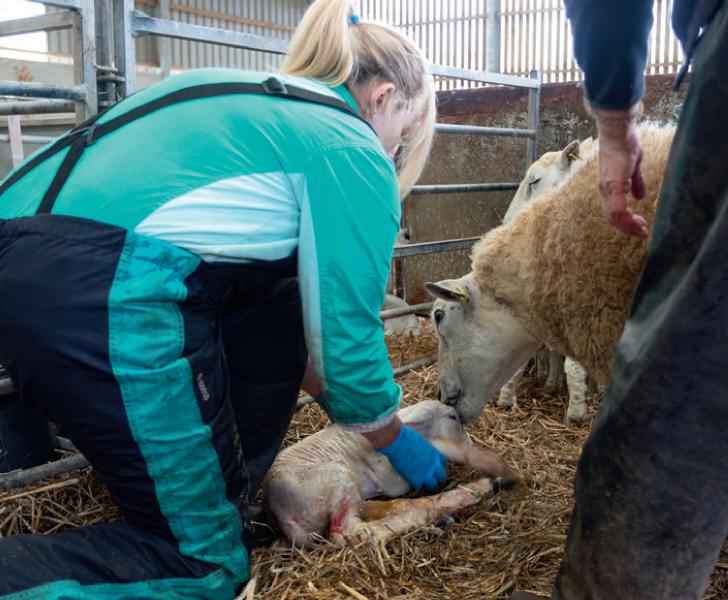
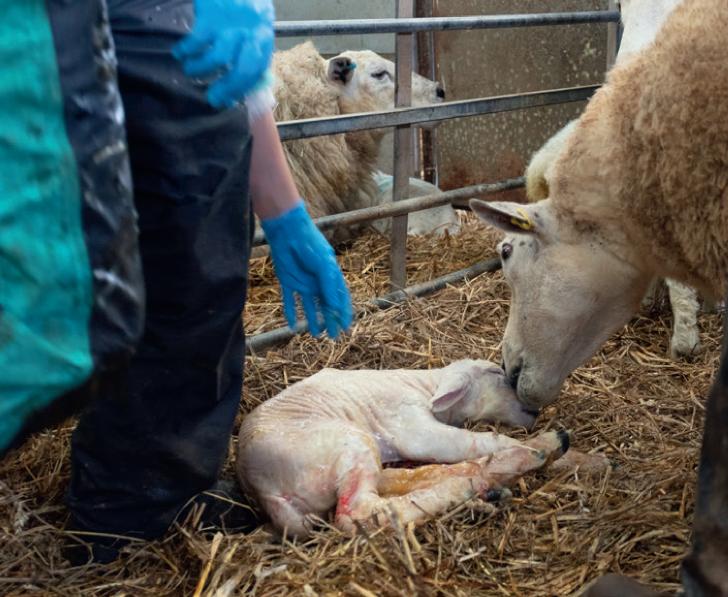
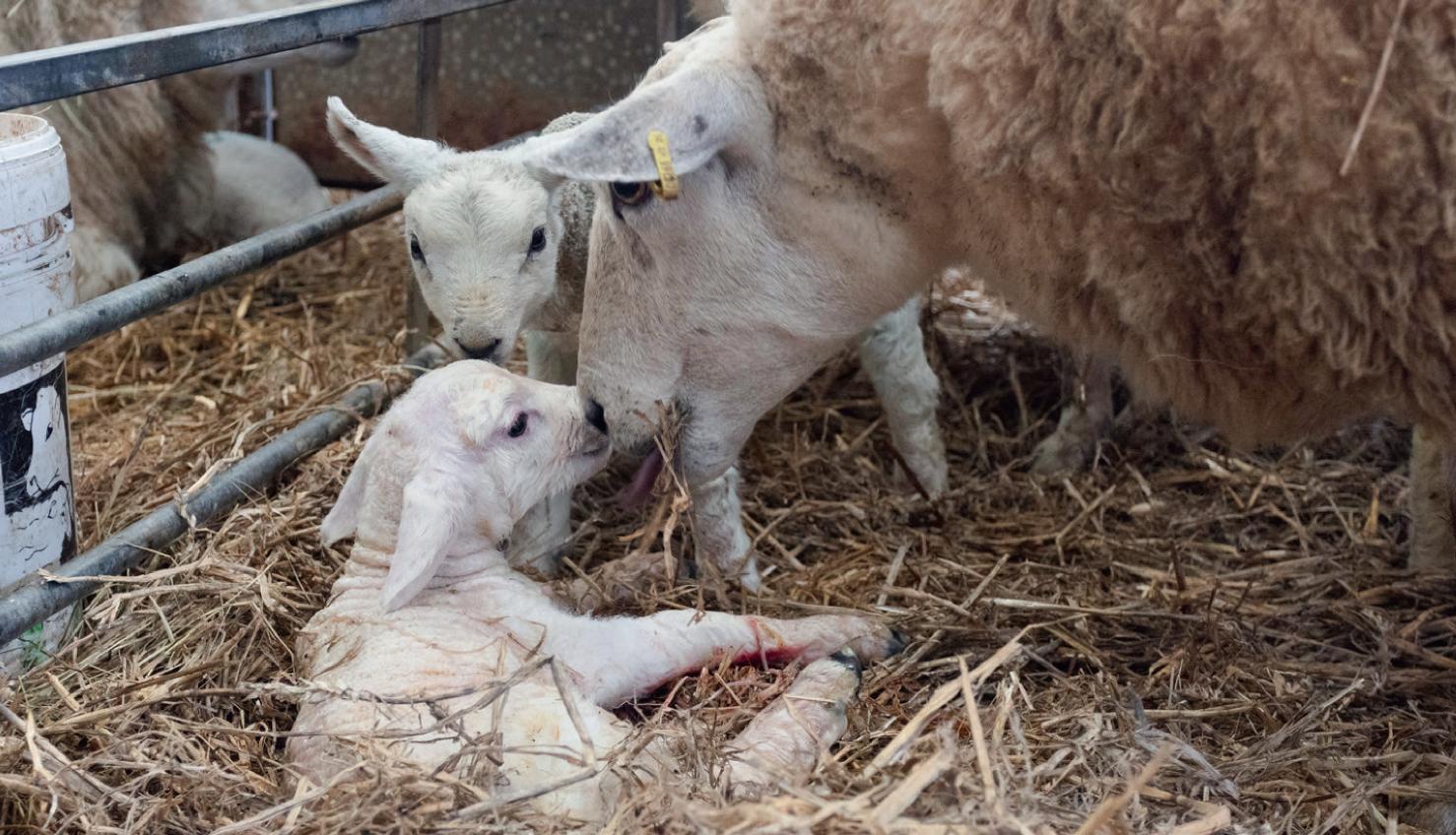
maximise on the fock’s return.
Looking to target potential customers directly, I went about establishing our Facebook. The business operates as ‘Billy Bob’s Farm’. Born from the breaking down of our second name and something my husband’s friend coined us after getting married (which at the time I hoped wouldn’t stick).
Moving through the legal tick list to get us set up with the council as a food business was simpler than I imagined. Both environmental health and our local council were helpful and ofered clear, simple advice. I did a food hygiene
certifcate course online to ensure we were working within the correct means.
At the time the global pandemic was upon us, and the UK had regained its appreciation for good quality, homecooked food. Especially as the public had more time at home and the option of fast food was removed.
It was at this point we began, unaware, our second diversifcation mission. In lockdown I requested a vegetable plot. I had something modest in mind and my husband, Josh, cultivated a plot around 20 metres square. I felt like I was working in the dust bowl.
Naomi Williams-Roberts
May 2024 5

We secured the plot with electric fencing to keep the sheep at bay. Filling my basket with immense pride, my frst crop consisted of potatoes, broad beans, carrots, parsnips, and marrows. Then in the night, the sheep broke in and ate the lot! All except my marrows and pumpkins.
Saved by their natural defence mechanism, their leaves proved a texture undesirable to my thuggish mob of ewes during their nocturnal raid.
We cordoned the remaining plants of with sheep hurdles and at the end of the summer, I had my fnal harvest of 50 munchkin pumpkins.
We put a post on our local village Facebook page advertising them for 50p and putting them out with an honesty jar. The response was positive with many fnding homes with little hands.
The seed was sown and the next year we tried our luck at growing one acre of pumpkins and establishing our pumpkin patch. This allowed me to have fun with my creative side and Josh to master growing a diferent crop.
The frst year we started planting by hand – that was back breaking! We then
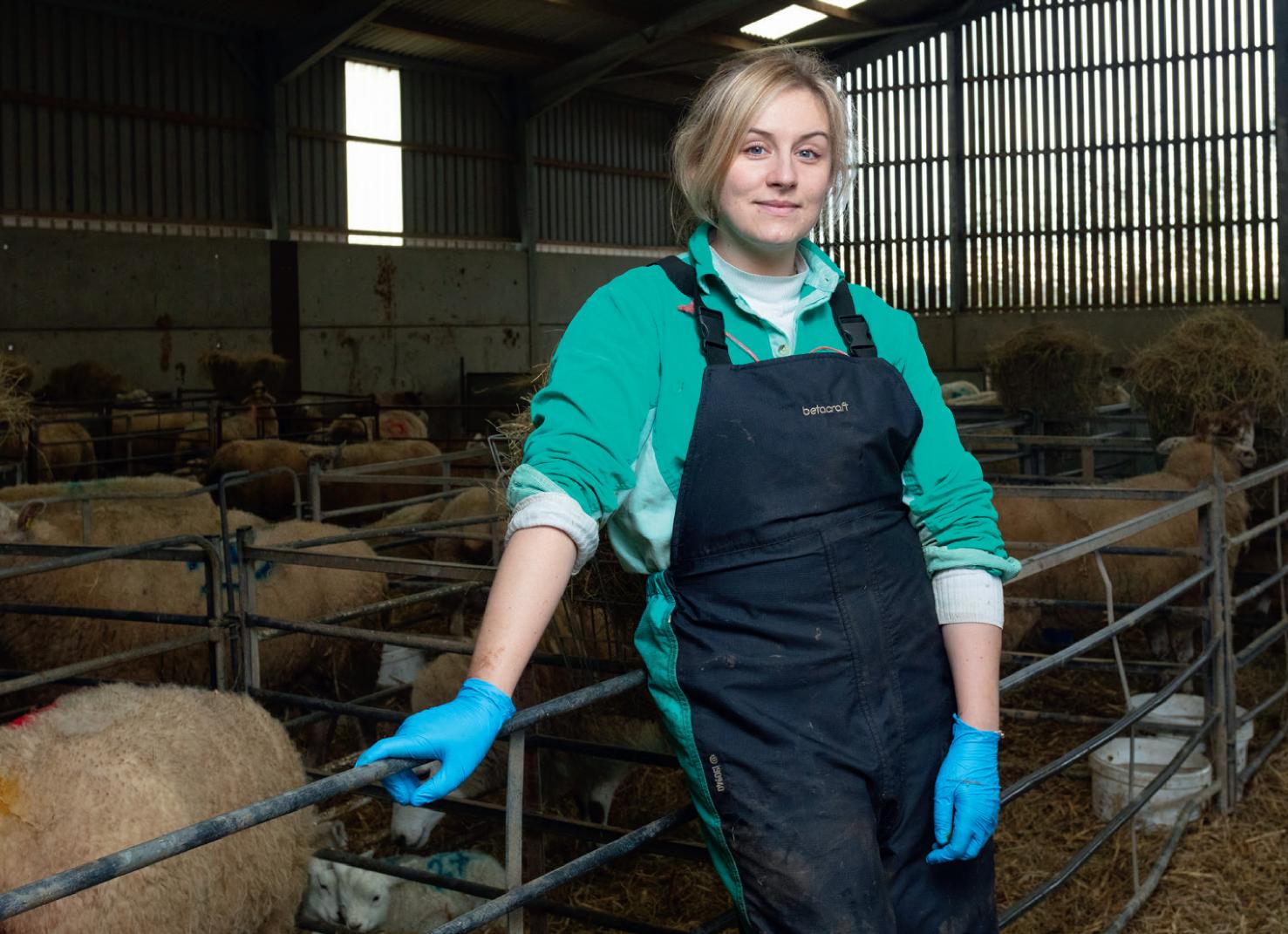
“We held a Christmas fair in the barn which was shared with turkeys in the final week of fattening. This worked out to be a fantastic marketing tool for selling the birds”
concocted a Frankenstein’s monster of a machine to help, later purchasing in a specialist tool.
Following the success and feedback from our frst pumpkin patch, we held a Christmas fair in the barn which was shared with turkeys in the fnal week of fattening. This worked out to be a fantastic marketing tool for selling the birds. The children looked on in amazement at these animals which they commented looked more like dinosaurs. Most were unable to draw the connection to what they enjoyed on their plates at Christmas.
The next year we ofered lambing days
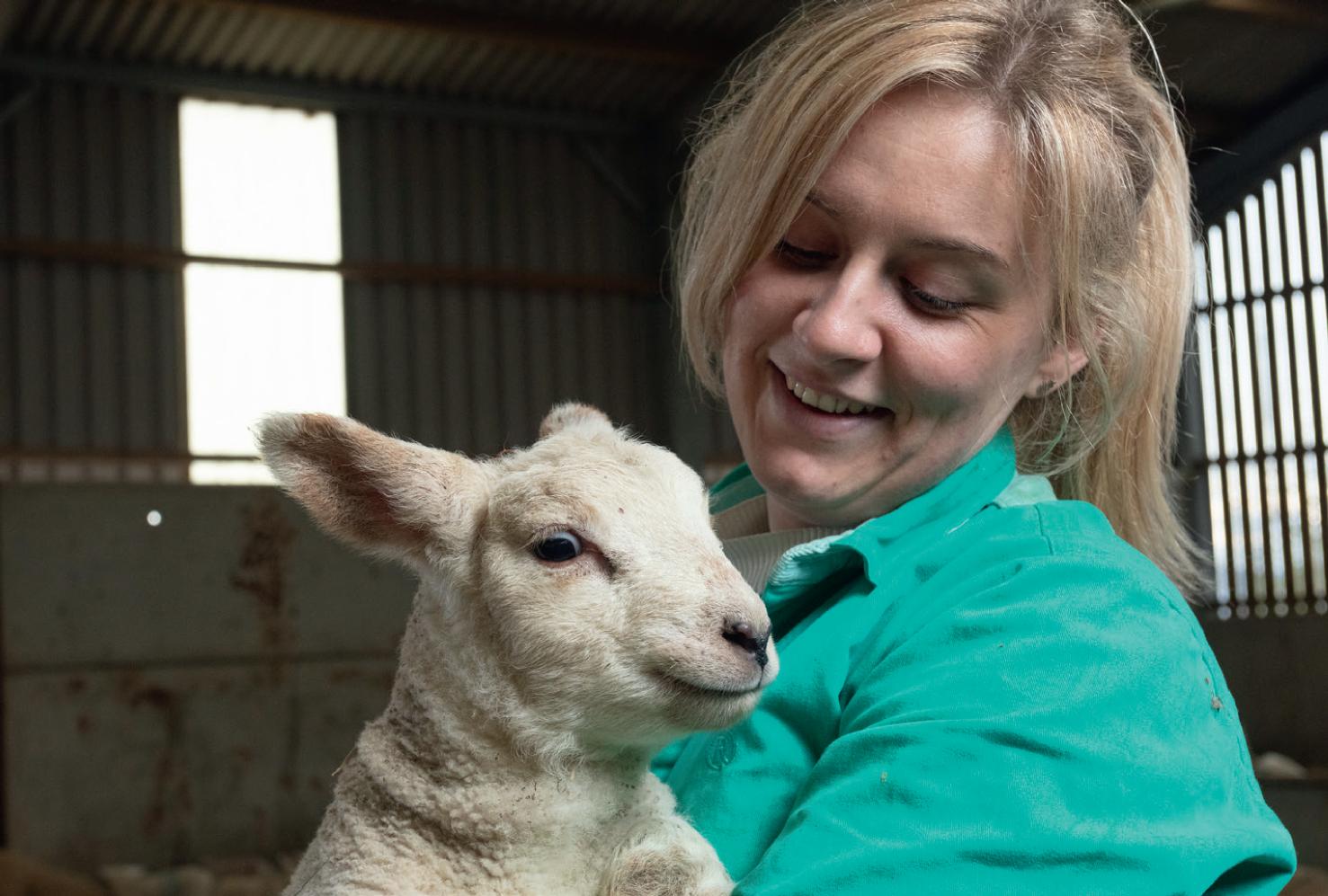
for adults and children, while in the summer we grew sunfowers –ofering cream teas, bouquets and photo opportunities.
When autumn came back around, we reopened the patch, holding a cinema event to ofer something to set us apart from other events at the time. In June, we will be starting the preparations for our fourth year. I can’t emphasise how important social media has been for our business. I try to be as open as possible when sharing our journey online and am amazed when people recognise us from our posts.
I have had negative comments from farmers, never from the public. This attitude can be really damaging. While I understand why farmers are hesitant to share their realities, essentially we are the window into the industry – we need the public and the public needs us. In addition to sharing our events on local Facebook groups, and encouraging hashtags, we also work with local newspapers, who always welcome a story, and have engaged with infuencers, ofering free tickets in exchange for a review.
Each year we try and think of diferent things to help us stand out from the crowd. Having to move forward and adapt is something that farmers are experts at. Holding events ofers the perfect balance between farming and creativity. Even if the words ‘I have an idea…’ send shivers down my husband’s spine, we both wouldn’t have it any other way! P
Williams-Roberts May 2024 6
Naomi


Not a baa-d idea
NFU Student & Young Farmer Ambassador Sian Grove is a first-generation shepherdess on the Isle of Wight, who is diversifying her sheep flock by making use of their wool

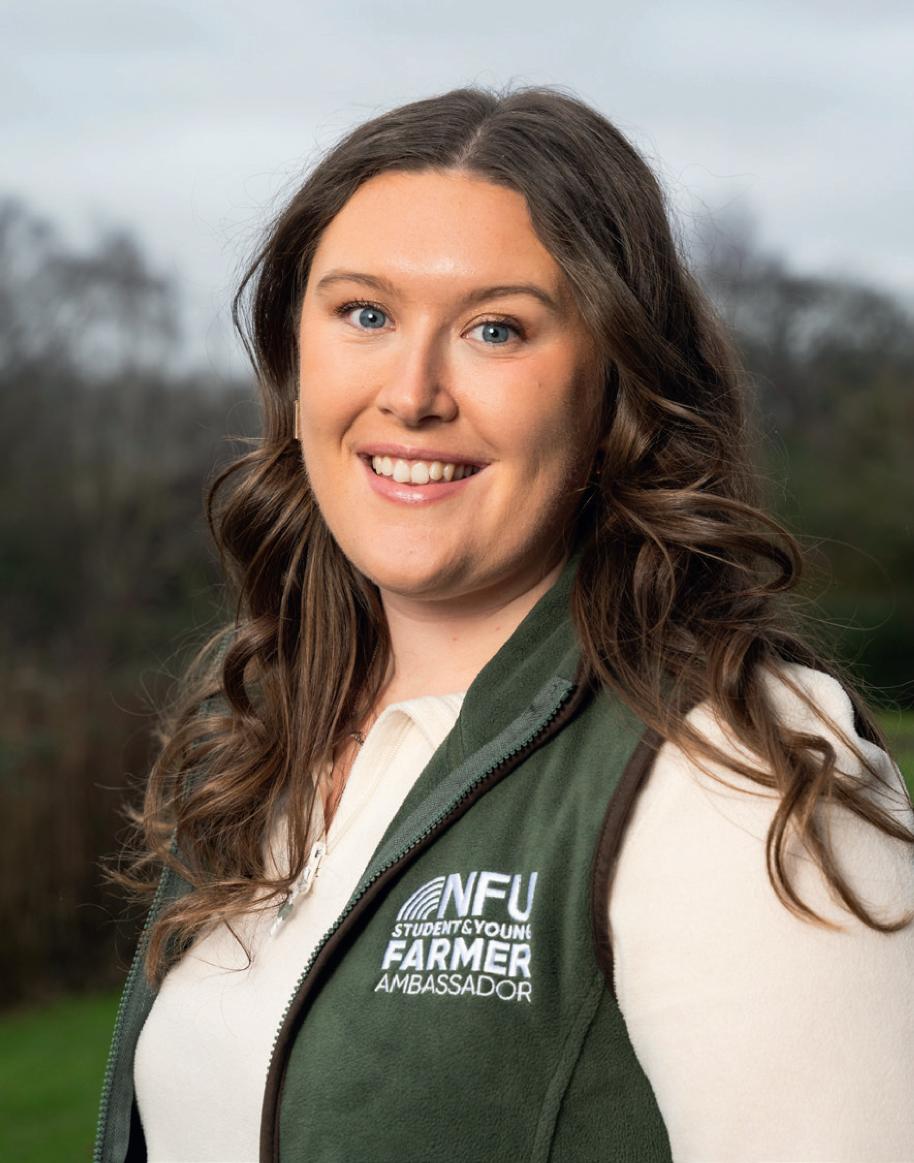
Shearing is a standard practice for the welfare management of sheep, and usually the shorn fleece is either sold to the wool board at not much of a profit or can sadly end up being thrown away. However, it is coming back into the limelight and is now being used in bedding and mattresses, to provide e cient insulation, keeping you warm in winter and cool in summer. It is also being used in house insulation, due to its crimped fibres, which create tiny little air pockets to trap the air, slowing down the transfer of heat.
I've found a further benefit to the fleece and am now marketing the by-product to gardeners. The sheep fleece and lanolin acts as a natural slug deterrent, as the
slugs don’t like the texture and so won’t crawl across it to get to the yummy fruit or veg. Plus any bits of poo still attached is a bonus bit of natural fertiliser!
The fleece also acts as an insulator to the plants when they are just getting started, and during the warmer weather helps reflect the sun’s rays to keep the soil and roots cool. Sheep fleece also naturally retains water, which helps to keep the moisture in, which with summer hosepipe bans, means you don’t have to water as frequently.
Similarly, it can also be used to cover overwintering plant beds to stop weeds from growing through, and also helps to protect the soil from freezing, all while naturally breaking down to add nutrients back into the ground.
Alongside this, it can also be used as a natural alternative to hanging basket lining, as the wool naturally retains water, and as bedding in bird boxes, with some of my customers adding it to their compost heap. As wool is a natural fibre, it will eventually rot down. Sheep fleece also contains nitrogen, which acts as a slow-release fertiliser for the soil.
More uses can be for gateway access, or path creation, as it can be placed under wood chippings, or gravel to help stop the mud getting so churned up.
I sell the fleece in boxes, which I advertise on Facebook through local gardening groups, selling directly to my customers. I've also teamed up with some local shops, who now stock my fleece boxes.
Sian is always looking to expand her business venture and you can follow her journey on Facebook and Instagram at @sians_woolly_wonders
Sian Grove
May 2024 8

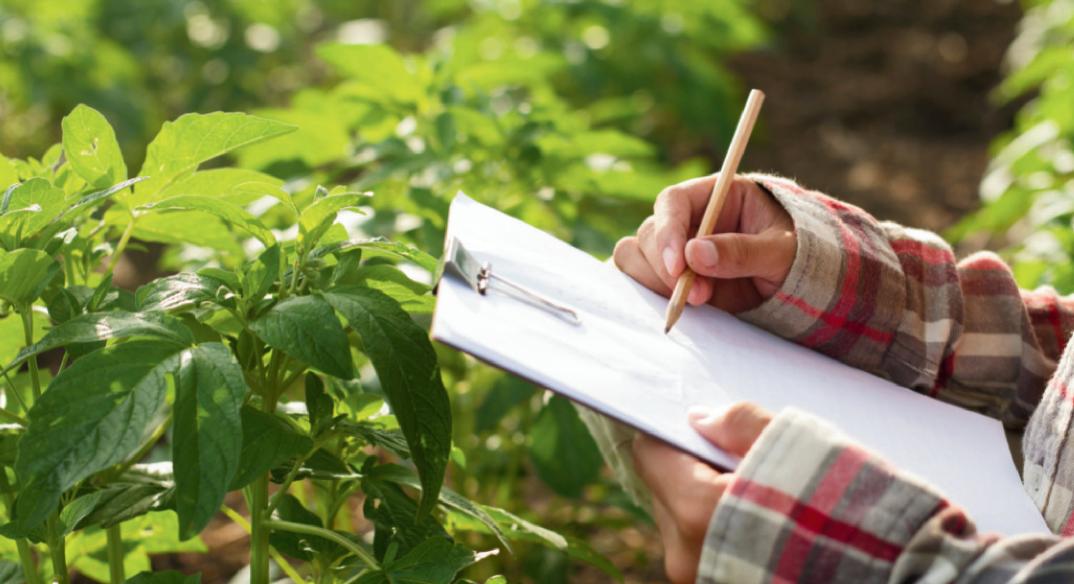




Are you ready to lead?
Take on the opportunity to develop within MDS.
At least 3 experiences in positions throughout the sector
Fast track your career
Starting salary up to £25,000
Exposure to the Trainee network and 67 Member companies
Designed to broaden your horizons, in roles across the food industry that make a difference, MDS provides the training and support that you need to succeed.

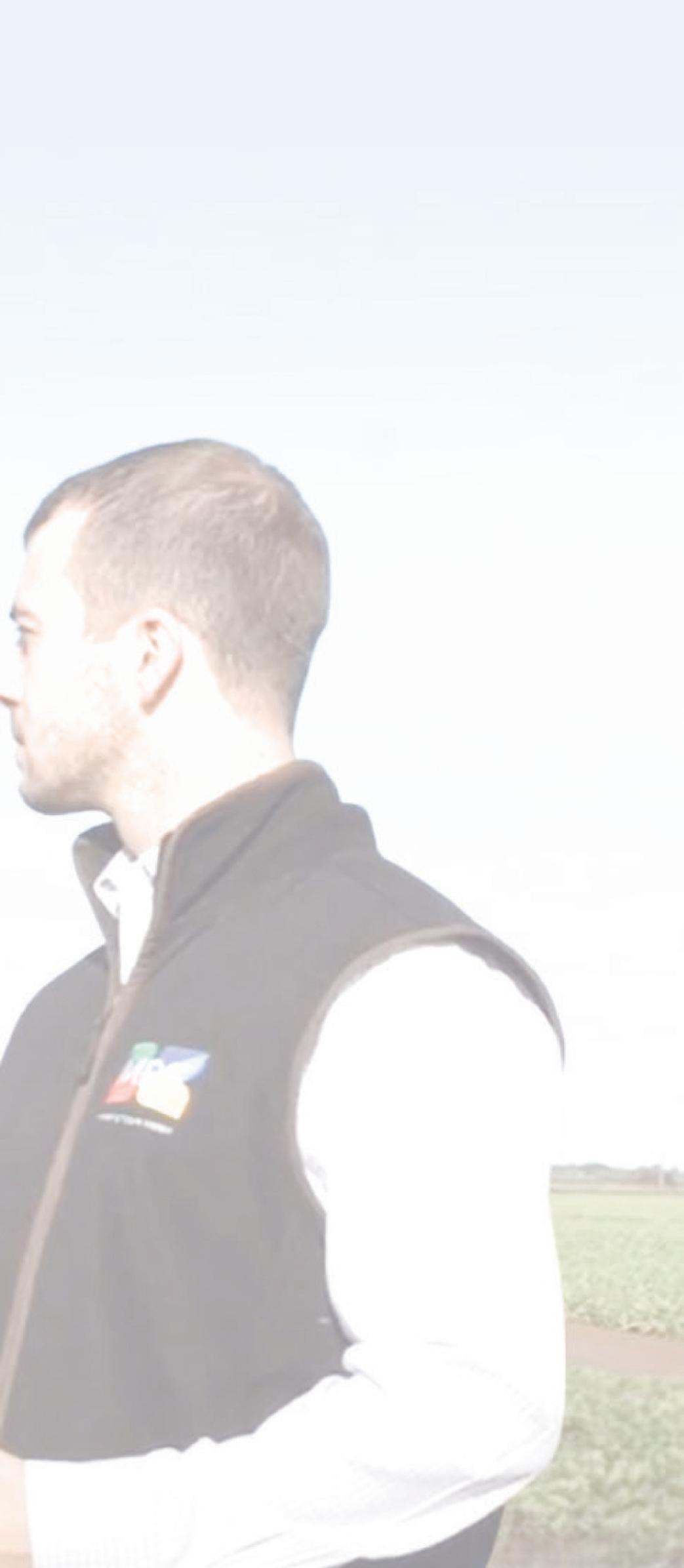
9
Find your career
MDS
COVER STORY
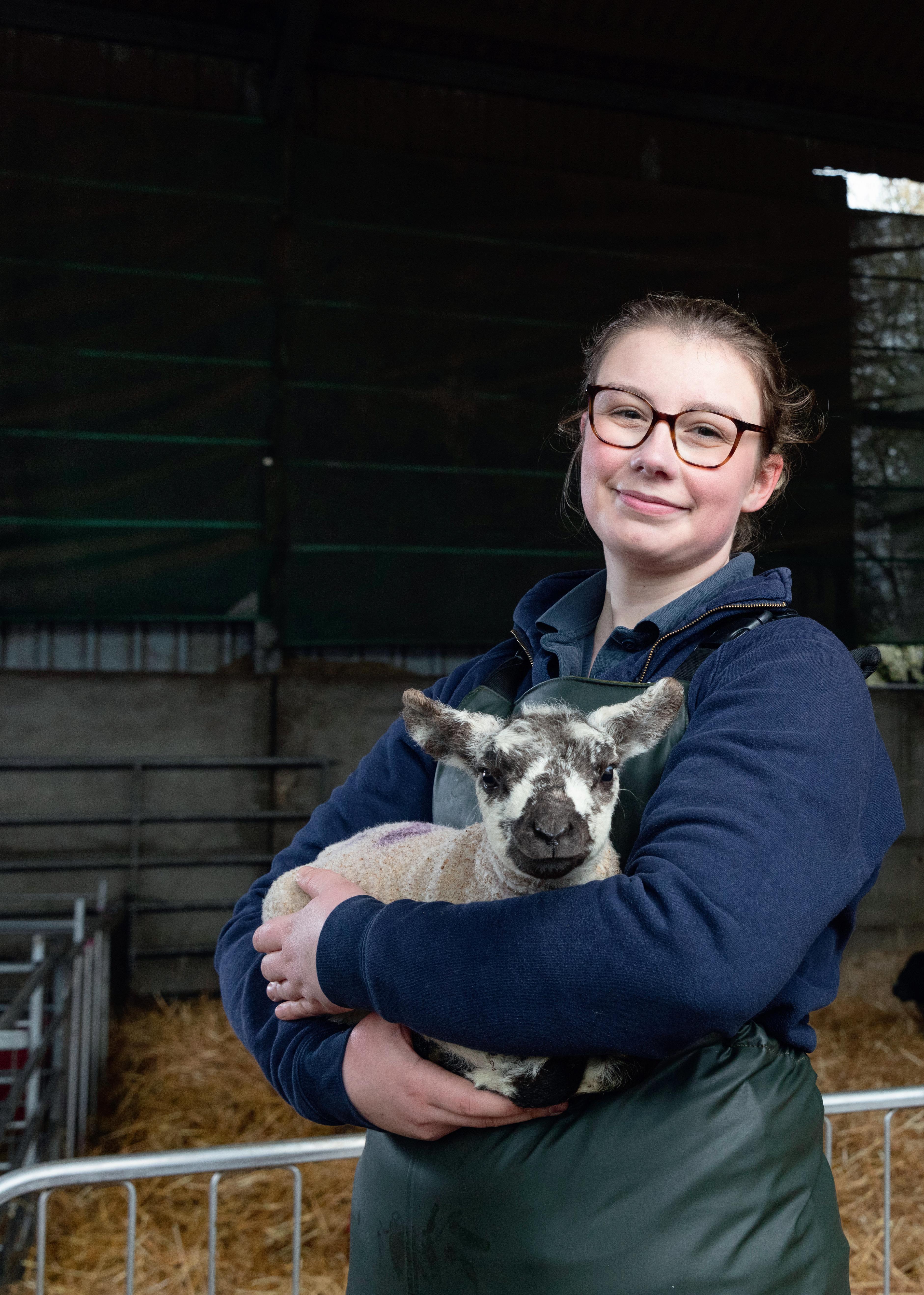
in her own words...
NFU Student & Young Farmer Ambassador
Molly Mead is passionate about increasing awareness of neurodiversity in the agriculture sector and among the farming community. She shares her journey and speaks to her peers about their experiences.
Neurodiversity
John Cottle
May 2024 10
In my experience, if you mention “neurodiversity” among the farming community you’re likely to be stared at blankly, while if you utter ‘ADHD’, you’ll be met with “ah yes I’ve heard of that – naughty child syndrome.”
I hope in sharing my story on being neurodivergent, the farming community might gain a better understanding of what it’s like to have a mental disability and that we’re not ‘victims’ or attention seekers –we just want you to understand and accept that we’re diferent.
Since primary school, I’ve never ftted in. I struggled making and keeping friends.
At 19, I had an initial assessment for autism and was told it was highly likely I was autistic. This revelation meant that after years of doctors attributing my mental health struggles to hormones and adolescence, and being prescribed various antidepressants, I fnally had an answer to why I was diferent. What had previously been diagnosed as panic attacks were meltdowns. My hypersensitivity and reactions were due to poor emotional regulation because I was autistic. My obsessive hyperfocus on subjects of interest was because I was autistic. It was all starting to add up.
Following my consultation, I became hyperfocused on autism itself, gaining a much wider knowledge of what it meant to be autistic and the diferent neurotypes. As my knowledge expanded, I began to suspect I might also have ADHD –something that was confrmed at age 22.
I’m passionate about raising awareness of the prevalence of neurodivergence and how it shows up in everyday life. It doesn’t

“I’m passionate about raising awareness of the prevalence of neurodivergence and how it shows up in everyday life”
necessarily mean we can’t do things, but it might be harder for us to achieve tasks that others fnd easy. It’s essential we are open about our needs so we can function efectively, and it’s important employers are open to discussing these needs and what accommodations can be put in place. When I interviewed for my current job, I didn’t disclose my mental disabilities because I was worried I wouldn’t be hired. This is why we need to de-stigmatise neurodivergence; so we don’t feel scared to talk about it. In a time where the farming industry desperately needs more workers, we must ensure it’s an accommodating and safe environment for people to become part of. There has been a massive shift in the conversation around mental health within the rural community over the past 10 years or so, and I hope my drive to raise awareness of neurodiversity will only expand this.
An ideal job
I’m constantly facing challenges because of being autistic and ADHD – I’m fortunate that I’ve been able to hold a full-time job. This isn’t something everyone is able to achieve. Some people might challenge us and say we’re using our neurotype as an excuse, but I don’t think that’s a fair
Neurodiversity
May 2024 11
comment. I’d like to think I’m a reliable and hard-working person, but equally I know I have limits so I have to adapt the way I work (for example, wear headphones or take more regular breaks) to ensure I’m working most efciently.
Because of my neurodivergence I have sufered with poor mental health massively for all my life, with depression, anxiety, self harm, and suicidal ideation being huge problems. These are not things that are easy for me to talk about, but it’s important I do so that others can relate and know that they are not alone. There are also the daily challenges of poor working memory, making multiple attempts to leave the house in the morning (because I’ve forgotten various things), and the chronic exhaustion of trying to keep up and lead a ‘normal’ life.
I currently work as a farm vet technician and bTB tester. This mostly involves TB testing cattle, but I also work with sheep, goats and alpacas, as well as disbudding calves and conducting faecal egg counts for clients.
My neurodivergent traits make this job ideal for me as there are set working hours
which give me the comfort of having a routine. Equally, as I get bored easily and need variety, visiting farms and meeting diferent people helps to keep things interesting.
I also get to help vets, where time allows, which means I get to see some interesting cases that I wouldn’t usually have the opportunity to. It’s nice to work in the agricultural sector without being a full-time farmer as my struggles with fatigue mean it’s essential I make time to switch of and recharge. It can, however, be challenging because being on farm and TB testing is usually a very loud environment which can sometimes be difcult to work in, and farmers are often understandably very stressed while their test is being done. Talking to new people so frequently can also be challenging but at the same time, is also one of the best things about working in the sector – along with learning how people farm diferently.
I’ve had to learn to switch of from work when I’m not there, I really love having a nice hot bath to relax and recharge after a day at work. P
How autism & ADHD show up day to day:
The need for routine (my autistic side)
Autistic people usually love routine as the repetitiveness and knowing what to expect makes them feel safe. This is why dairy farming could be the perfect role for an autistic person. I hate being late and to me being early is to be on time!
The need for variety (my ADHD side)
I get bored very easily, so whatever job I do needs to have some sort of variety to it. Being a vet tech is great for me because I’m visiting diferent farms and meeting new people each day.
Social difculty
I love talking to people if I feel safe around them. Meeting new people can often be daunting and often requires me to mask a lot.
Masking
Adjusting my personality or behaviour to try and ft in. This is something I have no control over as it’s so second nature. Particularly prevalent in females as growing up we naturally try to ft in with the crowd.
Justice sensitivity
This is an important autistic trait I don’t think many people know about. If I feel strongly that there has been injustice in a situation it leads to a strong emotional reaction and can often lead to difcult interactions.
Emotional management
I feel nothing or everything at once. When I feel things, I feel them very strongly. Everything in between strong emotions just feels like I’m in limbo.
CASE STUDIES
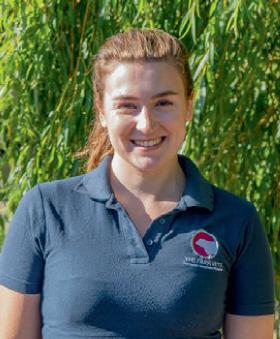
Sally Kitchiner 24, farm vet I was diagnosed with dyslexia at 16. I do struggle with certain things but it also has given me some extremely useful skills which have helped me get to where I am today.
Many people with dyslexia, including myself, are great problem solvers. I like fnding patterns and dissecting problems which is so important in my job! This helps me be methodical and logical which really helps when in high stress situations and enables me to keep calm and think clearly.
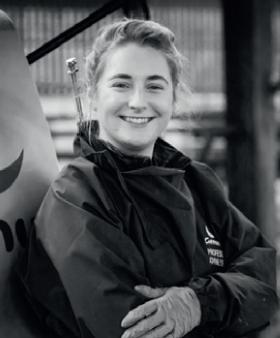
Sensory triggers
Noise and touch are most triggering to me. When things get too loud it can make me uncomfortable, and in the worst cases triggers a meltdown. I also don’t like people touching me, there’s a select few people who I allow to hug me.
Rejection Sensitive Dysphoria
I feel emotional pain because of feeling like a failure or ‘rejected by people’. Often selfinficted due to overthinking a conversation after it has happened, looking into the way someone said something to me or their facial expressions.
Stimming
Pulling weird faces, repeating sounds/songs (echolalia), fdgeting, picking my face, rubbing or tapping my feet.
Amy John 27, sales and breeding advisor (Genus) When I was diagnosed as neurodivergent, having dyslexia and dyspraxia, I thought well I’m clumsy and am just always going to struggle. But, as I learned more about myself, I learned there is much more to it than that.
Having dyspraxia means I work harder, which in turn, makes me more motivated and ultimately better informed.
Organisation is more important than ever when you are neurodivergent, which is funny because poor organisation is classed as a ‘symptom’ of dyspraxia! I need to be more organised than my peers because if a conversation goes in an unexpected way, I need to be prepared so that one of my ‘blank’ moments doesn’t arise.
I read once that being dyspraxic makes you more resilient. I couldn’t agree more. Working in sales within agriculture isn’t for the faint-hearted, you get some real highs, but you do get setbacks along the way.
Having dyspraxia gives me the resilience to look at setbacks as more as a goal of what to change next time. I am thankful for my dyspraxia and dyslexia - it has helped me be where I am today.
May 2024 12
Neurodiversity




DERBYSHIRE LANDSKILLS
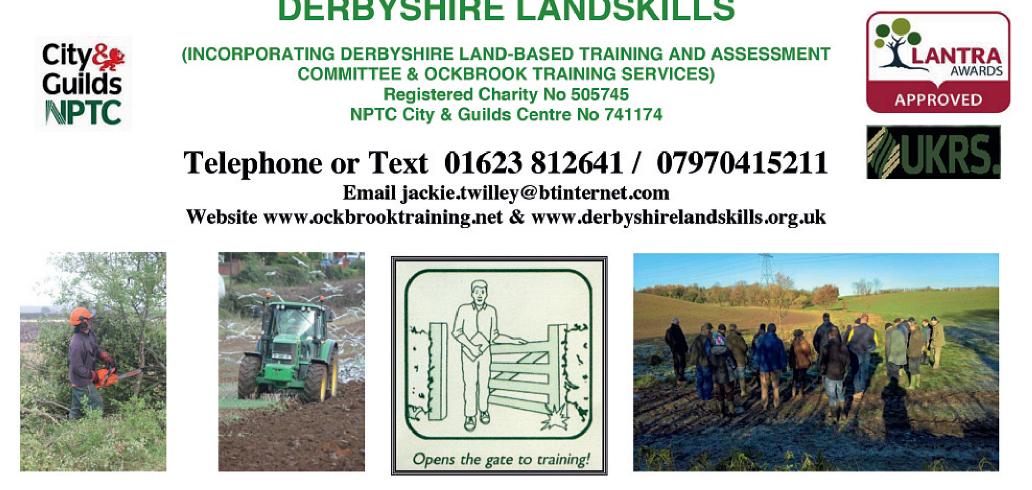
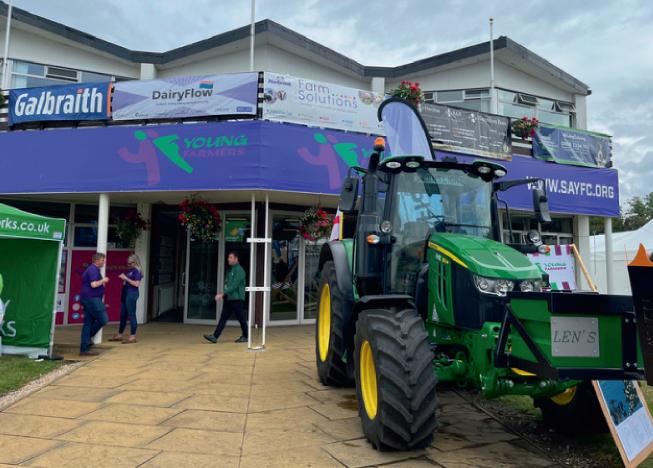

Enterprise Groups for Arable Crops and Vegetables also available FOR FURTHER INFORMATION CONTACT JACKIE TWILLEY
REGISTERED WITH LANTRA, CITY &GUILDS, UK RURAL SKILLS, and MEMBERS OF C.D.S. TRAINING

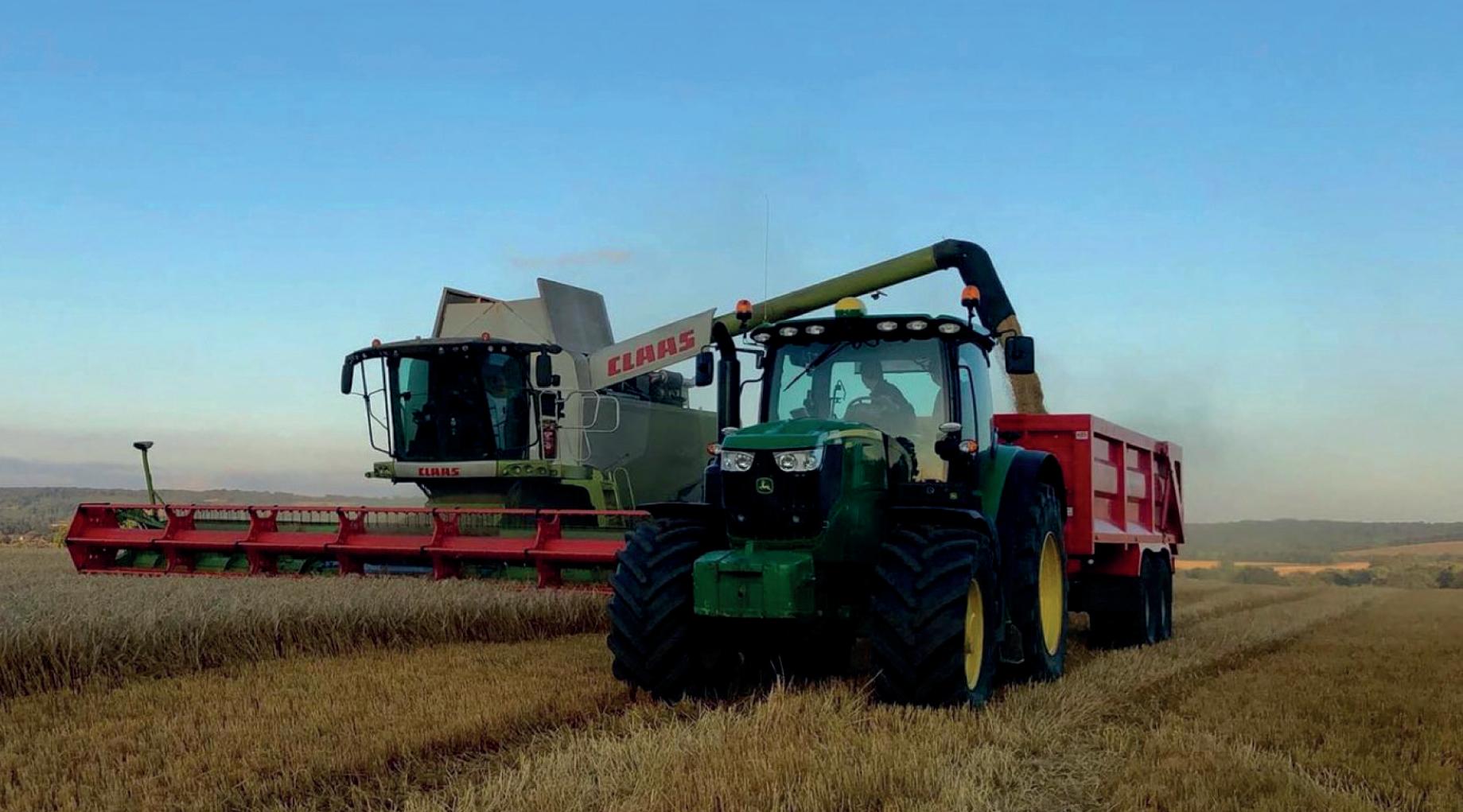
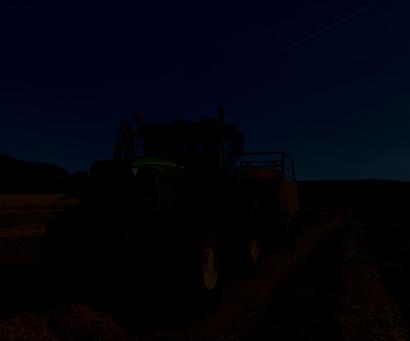
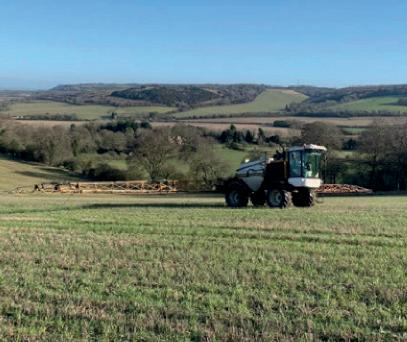
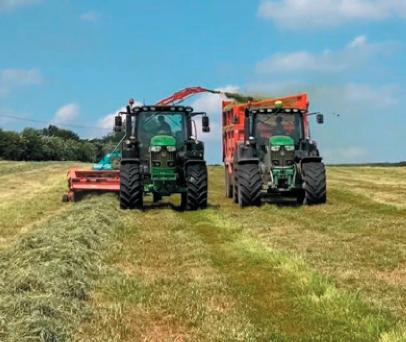






May 2024 13 NEXT GEN ROYAL HIGHLAND SHOW 2024
info@fieldfarmtours.co.uk 01636 616 060 18th June 2024 -3 nights Entry to show on Thursday 2Localfarmvisits including lunch 3* Accommodation-Bed &Breakfast Optionalextras available £397 perperson Based on 2people sharing a double or twin room
www.fieldfarmtours.co.uk
(INCORPORATING DERBYSHIRE LAND-BASED TRAINING AND ASSESSMENT COMMITTEE &OCKBROOK TRAINING SERVICES) Registered Charity No 505745 NPTC City &GuildsCentre No 741174 Telephone or Text 01623
jackie.twilley@btinternet.com Website www.ockbrooktraining.net
PROVIDER OF QUALITY LANDBASED TRAINING
1975 CITY &GUILDSNPTCCERTIFICATES OF COMPETENCE
LANTRA AWARDS SAFE USE OF PESTICIDES SAFE USE OF CHAINSAWS TRANSPORTOFANIMALS TRACTOR DRIVING, SHEEP DIPS, VETERINARYMEDICINES, FORKLIFT
MORE
812641/07970415211 Email
&www.derbyshirelandskills.org.uk
SINCE
AND
TRUCK & TELESCOPIC HANDLER, ATV’S. BRUSHCUTTERS/TRIMMERS, BRUSHWOOD CHIPPERS, MOWERS, MOLE CONTROL AND MANY
AGRICULTURAL &BUSINESS MANAGEMENT CONSERVATION LEGISLATION AND TECHNICAL SUBJECTS
For moreinformation contact us: 01296 612 201 info@valetraining.co.uk www.valetraining.co.uk Marsh Hill Centre, Marsh, Aylesbury,Bucks HP17 8ST Vale Training Services Ltd. offer awide range of training and assessment designed for small and land-based businesses. Our instructors areexperienced and accredited with nationally recognised awarding bodies. Courses can be tailormade to customer needs or taken from our open course programme which includes construction, chainsaw operation, and health and safety skills. All courses arehighlypractical and arerun on alow instructor/trainee ratio with competitive rates and national accreditation.
REMEMBERING THE FORGOTTEN:
Dementia and farming
Young farmer Megan Morgan shares the impact of dementia on her family and explains why succession planning and being open with your mental health is so important
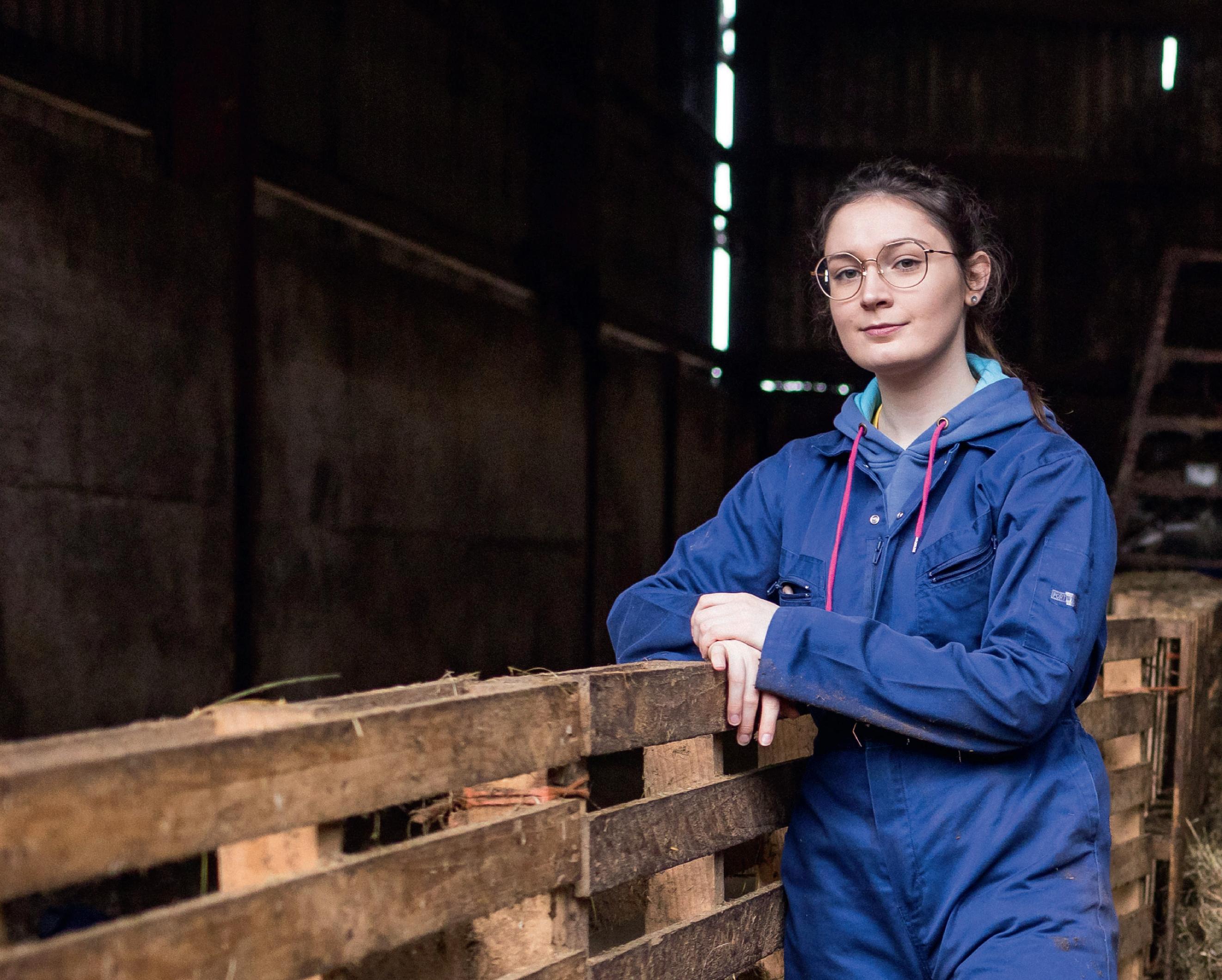
In 2022, the leading cause of death across the UK was dementia and among those statistics was my grandmother, Gwyneth Morgan of Pantynawel Farm, aged 87. The disease, which will afect one in two of us either directly or indirectly throughout our lives, is something that as a family and business we are still sufering the efects of more than two years on, both mentally and fnancially.
My grandmother, or ‘Nan’ as she was to me, was a selfess, hardworking, loving and charitable woman, an inspiration to many in more ways than one and, like many of her generation, kept any and all of her problems to herself, adamant that she didn’t need nor want help.
Thinking back, the signs of Nan’s dementia were there for years before it really impacted her, but as someone who would see her daily the changes were not obvious to me at the time. It was only in later stages of the disease that these changes became harder for Nan to hide.
At the beginning, her forgetfulness,
which was mainly asking several times if you wanted a cup of tea, a drink I have never liked, was easily attributed to other things such as stress and her incredibly hospitable nature. Alongside doing the admin side of the family farming business, she was also the primary caregiver for my grandfather, Howell, who had a stroke the year I was born in 2001.
Certain things that we have all done became more of a regular occurrence for my grandmother – perhaps your tea would be too sweet, the potatoes would occasionally boil dry and, on one occasion that we both laughed over, she melted of the bottom of the black pepper pot on the hot stove. The house was always full of visitors, whether it be friends or family, and Nan managed to hide her symptoms well from us all – including the GP. Business-wise, and unbeknownst to us, there was paperwork being mislaid, bills forgotten about and forms not flled in.
Following the death of my grandfather in 2014, my Nan’s forgetfulness got worse. It only became apparent to me
that something was really wrong when a few weeks after my grandfather died, we were both sat in her living room where she turned to me and asked ‘where’s Howell?’, a question soon followed by a desire to go home, a home she had not lived in since at least 1957.
Our family’s concerns about Nan’s dementia were initially dismissed by the family GP, so a diagnosis was very hard to obtain. Tests did eventually show that Nan was sufering from vascular dementia, the second most-common dementia after Alzheimer’s disease. Apart from being given a number for in-home carers, we were given no guidance, no signposting, no social worker or anything to help us or my grandmother with her dementia care/ diagnosis, not even from the charities or organisations that both of my grandparents had been involved in or supported throughout their lives.
With her dementia progressing and dad now singlehandedly running both the admin and practical side of the farm, I would take a dinner up to her after school and spend as much time with her as I
Succession
John Wellings
May 2024 14
COVER STORY


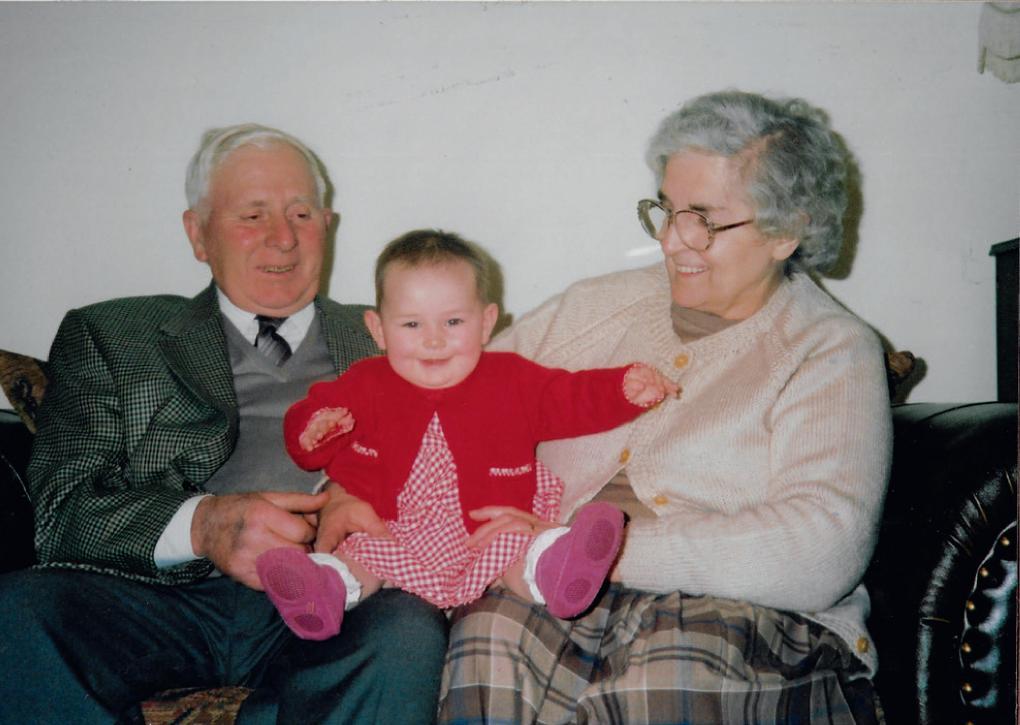
ABOVE: Megan with her grandparents, Howell and Gwyneth
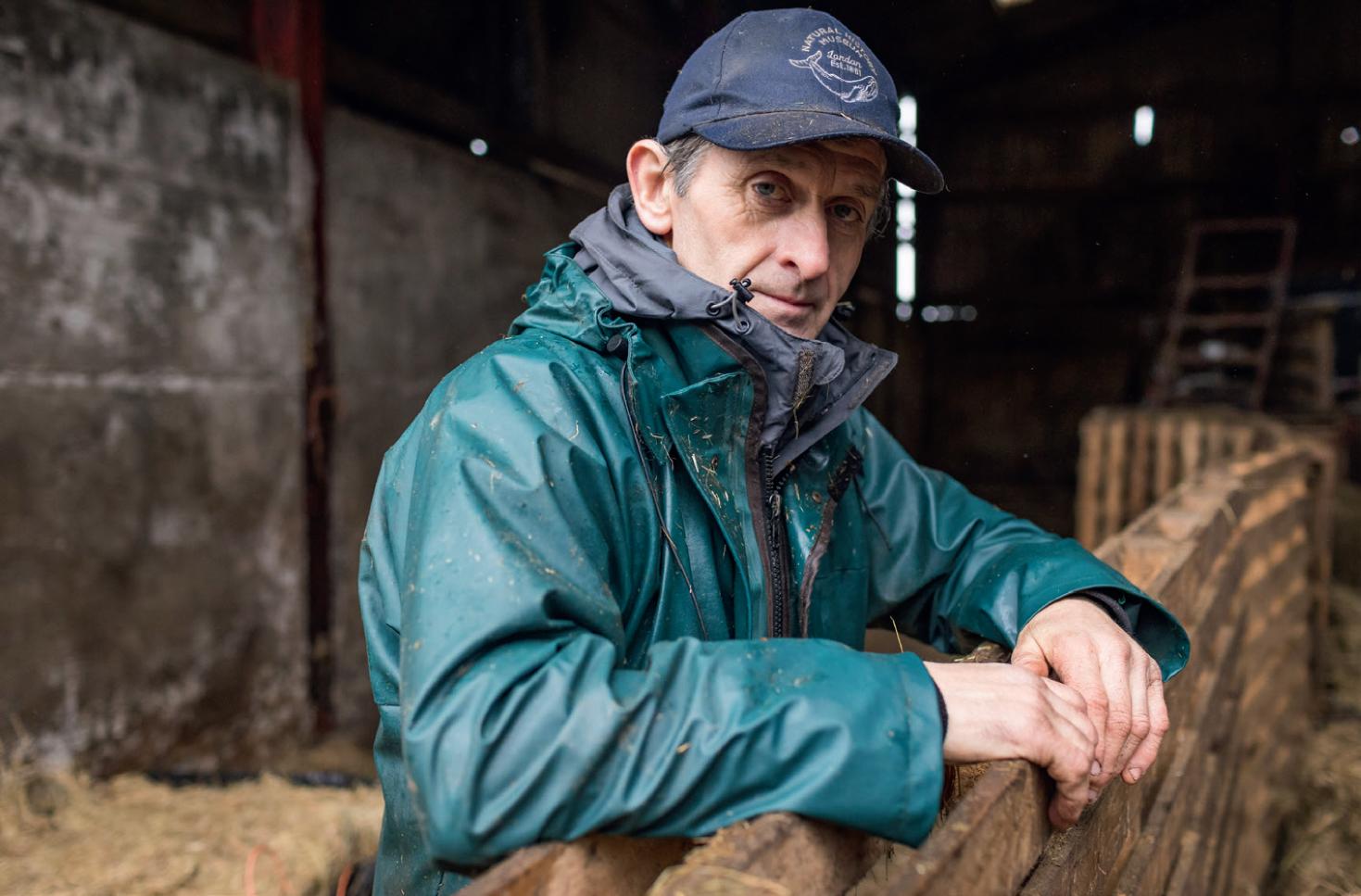
Gareth Morgan: “I was expecting it (the dementia symptoms) based on what my grandfather went through. I thought I was preparing myself for the first time my mother didn’t recognise me, but when you hear the words ‘and who are you?’, it is not your mind that goes through it, it’s your heart. It is heartbreaking. So, although in a way I was prepared for it, it’s still not the same as when you actually experience it. That really is something else.”
be safer for my Nan to go into a dementiaspecific care home local to us.
Dad left his job and ploughed the vast majority of his life savings into settling bills and getting the accounts back into the black while simultaneously his mental health seeped into the red.
could. Walking into the farmhouse was like walking into another world, a world where both of Nan’s parents were still alive, my grandfather was working up the cattle shed and her in-laws still lived in the other part of the house, and a world where I liked tea.
Often, I would hear her talking to people who weren’t there, but it was easier to live in Nan’s world than to break her heart repeatedly by telling her that the people she spoke so fondly of had been dead for longer than I had been alive.
Following a fall at home and issues with the in-home carers, we thought it would
As no will had ever been put into writing and we were still going through probate following my grandfather’s death, like many farmers, we were asset rich but cash strapped.
In order to pay the extortionate private care home fees, as the farm was still under my Nan’s name, part of my grandparents’ farm which they had worked all of their lives to build up, had to be sold off.
I spent hours every night researching dementia or looking for at least one site or phone number where farmers could call for help and guidance specific to our situation and found nothing. My family and I learned a lot about succession planning and the importance of being open with your mental and financial struggles in
“Too often, LAS only receives a request for support after the e ects of this disease have begun to take their toll, resulting in anguish for the family and the need to go through various complex legal processes to set things right.
“This can be costly, stressful and time consuming, but if you act early enough, legal help can be obtained to put your farming a airs in order before the worst happens. As the saying goes, ‘prevention is better than the cure’. Legal Health Check and Contract Checking support are both available for NFU members via the Legal Panel Firms, and LAS subscribers can receive financial support towards the costs of those services.”
Regina Owusu, NFU Legal Assistance Scheme Manager
a way that nobody should have to – the hard way.
The lack of dementia awareness, information and resources within agriculture is definitely something that needs to be rectified.
Succession planning would’ve helped immensely in our situation, not only planning for what you do when someone has passed away but what you do when, in the case of my grandmother, someone cannot legally make decisions for themselves anymore.
It is important that wills are written and legal, and not unwritten promises like in the case of my family, where greed can cost more than money.
Two years on from the death of my grandmother and we are still going through probate, almost ten years since it was first initiated following my grandfather’s death.
The emotional and financial burden still has its hold and while some days it may be harder to find a reason to smile, a lovely new life being born or watching calves running around their pen can make things seem a bit brighter, even just temporarily.
My only wish is that I could walk into the farmhouse just one more time to share it all over a nice cup of sweetened tea warmed in the teapot on the stove with my wonderful Nan, Gwyneth.
Find out more about dementia awareness and how to get support at NFUonline.com/dementia-awareness
Succession
May 2024 15
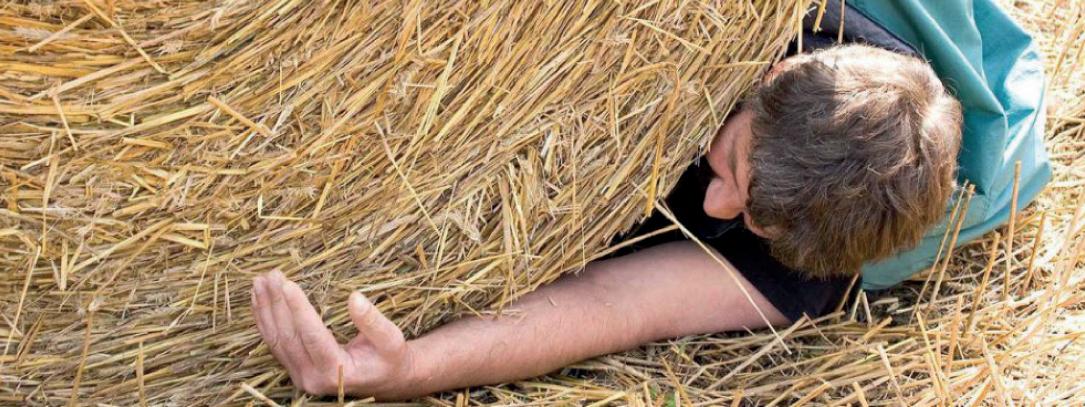

Training Course Content
·Emergency planning and remote medical assistance
·Catastrophic Bleeding Control
·Crush injuries
·Effects of extreme cold
·Lyme disease
Course deliver ydetails
Aminimum of 2contact hours in the classroom, consisting of practical and theoretical activities.This qualifcation can also be combined with the 1-day Emergency First Aid at Work or 3-day First Aid at Work course,providing the minimum contact hours and assessment criteria has been achieved.
Why choose Madeleys First Aid Plus?
Founded in 2021 after Louise left 30 years in the NHS as an Advanced practitioner in A&E/ITU,had spent 1.5 years in Covid ITU
WonFSB Best start-up business in the West Midlands in May 2023
Now trained 100s of delegates,including the Willey Estate in Shropshire in Forestr yand Farming First Aid
This qualifcation has been designed to provide the knowledge and competence for a learner to deal with emergency frst aid situations in aforestr y/agricultural environment. This qualifcation is designed to supplement aFirst Aider’s existing First Aid at Work or Emergency First Aid at Work qualifcation and covers the recommended topics stated in the Forestr yCommissionFirst Aidpolicy 2015. 07508 834906 enquiries@madeleysfrstaidplus.co.uk www.madeleysfrstaidplus.co.uk

Learn to Grow
MSc Sustainable Crop Production: Agronomy for the 21st Century
Study for aMaster’sdegree to prepareyou for a career in agronomy,research or consultancy
Our MSc programme will provide you with the scientifcknowledge and practical skills to understand the challenges of modern agricultural crop production, and to contribute to amoresustainable future.


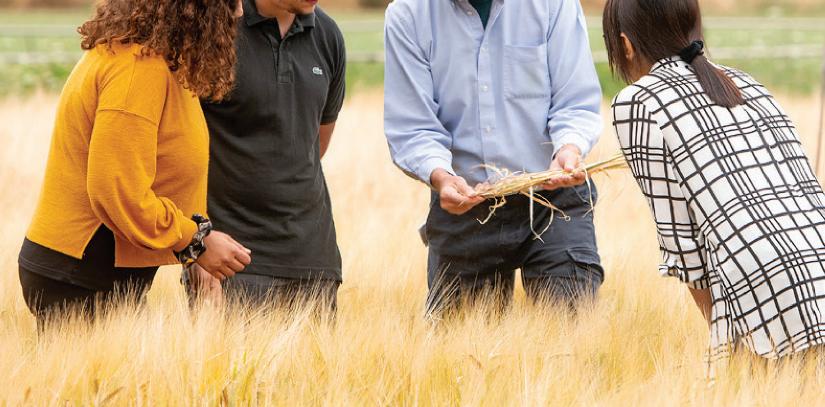
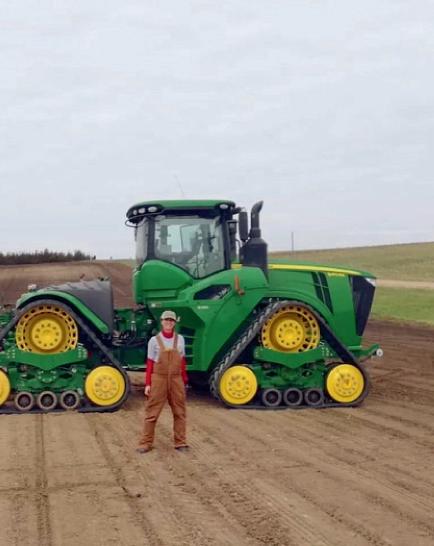


to


May 2024 16
Apply now for 2024 entry Scan
here
fnd out more
TRAVEL EARN LEARN AGRICULTURAL EXCHANGE PROGRAM caep A caep Train with top agricultural professionals in the UnitedStates! PROGRAMS: Agriculture Field Crops, Custom Combining, Swine, Ranch Horticulture Greenhouse, Potted Plants, Vegetable Production Equine Enology Turf Management WHO WE ARE: For more than 30 years, Communicating for Agriculture Education Programs (CAEP) has been designated by the U,S, Department of State as an official sponsor of the J1 visa. We have carried out the vision of giving young adults an opportunity to experience the world through agricultural exchange agriculture@caep.org www.caep.org CONTACT US: Next edition of Student Farmer out September 2024 Please cont act Scott Keyes on 07917 909 530 or email Scott.keyes@nfu.org.uk for advertising opportunities
Our man in Japan
Rupert Shinner shares the last instalment of a three-part blog series on his trip to Japan, after receiving the travel scholarship
I’ve just arrived home from Japan and what a time I had. Since the last edition, I’ve stayed on a farm in the mountains, visited two agricultural universities, explored a lot of Japanese cities, and visited the biggest farming company in the country.
During my time in the mountains in Kochi, I stayed with a family who have 20 Wagyu cattle, including calves, and also two dairy cows which they milked and made cheese from. They had also diversified into holiday lets with a log cabin – an incredibly beautiful place to stay. This area was famous for ‘red beef’ production, a type of Wagyu beef which is gaining lots of market share due to being a premium product that has had a lot of marketing put into it, leading to higher beef prices and increased semen sales.


A young vet took me round the area and showed me lots of different red beef farms, most of which had around 100 cows plus followers, so a rough total of about 300 head of stock. These farms were very well set up with modern machinery, similar to the dairy farm I had recently stayed on. The university I visited also had a herd of Red Wagyu, which the students were doing both meat and semen experiments with.
After 12 days spent exploring, with visits to Osaka, Kobe, Kyoto, Nara, Nagoya, Hakone, Tokyo and Niijima Island, I then travelled just north of Tokyo to visit the largest farming operation in Japan, where the headquarters had some 4,000 head of cattle alone – 1,200 milking cows and the rest Wagyu and Wagyu Xs. The operation, which has 10 farms in total, all of slightly different sizes, was quite an eye opener. It was interesting to note that all the manure was composted and reused as bedding.
Finally, I headed up to Hokkaido, the most northerly main island of Japan. The landscape here was very different, mainly because it was colder, meaning it wasn’t suitable for growing rice. As such, the fields had not been made smaller (which makes them easier to flood for tiered rice growing). The large, gently rolling, cultivatable land meant lots of forage was grown for feeding cows rather than importing it in, thus being more sustainable and much cheaper. They get lots of heavy snow in Hokkaido and the farms reminded me of Canada with their layout and the snow.
While in Hokkaido, I visited a milk processing plant where they bottled milk and made butter for the more heavily populated areas in the other islands and stayed on a dairy farm where we milked 550 cows twice a day through a 40/40 rapid exit parlour. One of the biggest threats in the area was bear attacks and I met one




“One of the biggest threats in the area was bear attacks and I met one farmer who, unfortunately, lost 50 of his 300 cows in one month to such attacks”
farmer who, unfortunately, lost 50 of his 300 cows in one month to such attacks!
HOW TO APPLY FOR THE SCHOLARSHIP
Anyone interested in applying for the scholarship should contact
The Devon Farmers Benevolent Fund secretary on fiona.rew@ nfu.org.uk
Once I had completed my itinerary in Japan, I flew to New Zealand to work on a dairy farm. I found New Zealand to be very different to Japan, with a much lower population and almost entirely grazed cattle and sheep production, exporting almost all the milk and meat produced.
I had a fantastic time travelling across Japan and have learned so much. I’m so grateful to have received the Devon Farm Benevolent Fund’s travel scholarship and would encourage others to apply when applications re-open.
You can learn more about Rupert’s trip on Instagram at @rupertsramble and on YouTube at @RMShinner.
Our man in Japan Photo: istock
May 2024 17


STAY DRY STAY SAFE SHED WEIGHT LOOK GREAT B1180
Fromits unmistakable Buckboot z‘Hard As Nails’ profle to itsrugged good lookingdealerbootstyling B1180 carriesits Buckbootz heritage andbranding with pride.With itsextendedwhole cutvampand beef y heel counterthisisawaterproofsafet ybootwithgravitasand real substance
Using constructionand componentsdesignedtowithstandthe roughest treatment, B1180 combines strength with lightweight thankstoan aluminiumtoecap, kevlarmidsole andthe newBuckbootz K11dual densit ysole. K11letsusretainall the legendary Buckboot zrubber outsoledurability andfeatureswhich nowinclude ladder grips, at a weight saving whichwillwin overanew generation of Goodyear arers. With Buckbootz characteristic e lock stitch the toeplate andbeef bberdepth at the criticalheel/ground brings threedimensionalBuck fex t ting with three fex-stretch areasat the bootcollar. Thismakes ftting andremovalastrollinthe park and enablesthe collar to retain itsneat look andsnug ftatall times.
B1180 als
welted safet y boot we w u o f at tention to detail up the outer sole r contact area


• Light weight Dealer boot

•DarkBrownCrazy HorseLeather
• Waterproof
• EN/UKCAsafet ycodes SB PS HROFOLGWR/ WPA
•Aluminium safet ytoecap
•Non-metallicantipenetrationNAILSTOPmidsole
•Slipresistant
•Heat(300ºC/60secs)and OilResistant Rubber
OutsolewithLadderGrips
•K11 dual density weight saving sole
•Widerfit ting at toearea
•Buckflexthreeway fex-stretch collar
•Sizes 6/40 to 13/47


Go to ww w.buckbootz.com.
To find your nearestAgricultural Merchant stockist call 01382 82 82 00 or email info@buckbootz.com
May 2024 18
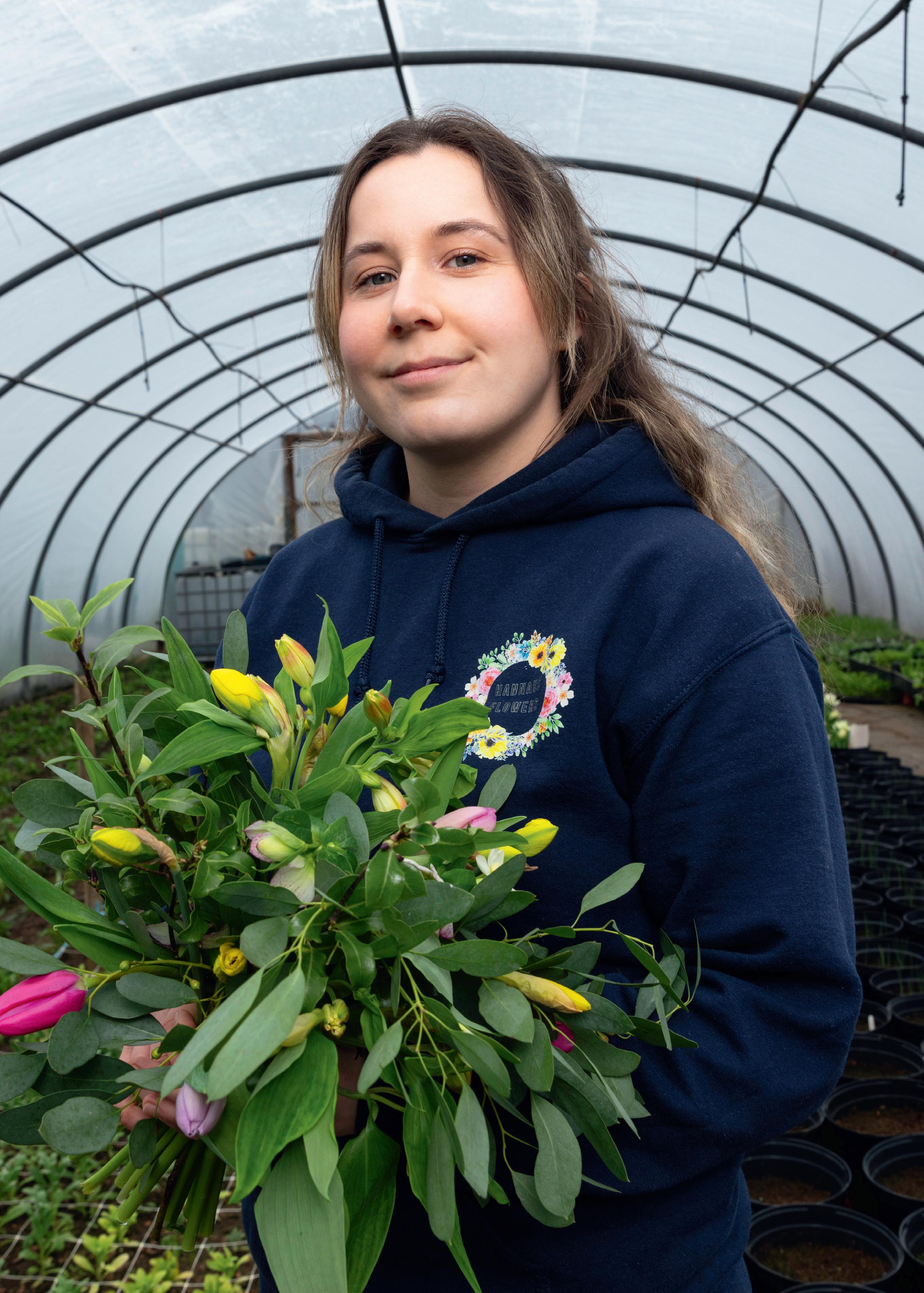
FLOWER POWER
Lincolnshire-based grower Hannah Benson diversifed into British cut fowers nine years ago and plans to shine a spotlight on the industry as an NFU Student & Young Farmer Ambassador – the frst in the cut fower sector
Hannah Benson COVER STORY
May 2024 19
John Cottle
Hannah Benson
Based out of Spilsby, Hannah’s Flowers ofers freshly cut, seasonal British blooms between March and late October.
The business is a diversifcation from the family’s small vegetable farm and sees Hannah cut, pack and supply wholesale markets, forists and the general public.
“I was studying agriculture at Riseholme College but moved to a production horticulture course as growing veg wasn’t really a great ft. As part of my new course, I started growing some fowers and ever since then I’ve just continued to expand and grow a bit more as dad has let me have more land.”
Today, the business is fourishing with Hannah growing fowers across fve acres – mainly outdoors, but with some more delicate blooms kept safe under the polytunnel.
“You have to keep evolving and moving with the trends”
She hand sows all her seeds and grows more than 50 diferent varieties of fowers over the seasons with her favourites including lupins, alliums, sweet Williams and softer blooms like cosmos and zinnias for wedding fowers and helichrysum and acroclinium for her dried fower work.
After branching out from growing carrots, parsnips, brassicas, leeks, beans and beetroot with her dad for wholesale and some market traders, Hannah went self-employed with her diversifcation in 2017.
Pre-Covid, she sold solely wholesale, but when the pandemic saw the country go into lockdown in March 2020 with restrictions on social interactions and retail businesses forced to close, Hannah recognised an opportunity to up her game. She began using her social media pages to sell to the public, who saw her fowers as a way to treat themselves and spread a little spring cheer during a tough time.
Building on that success, Hannah now sells to three wholesalers and the general public, ofering custom-made seasonal bouquets, occasion fowers, jam jar blooms, and dried fower wreaths.
She also runs a DIY ‘Flower Bar’ where the public can pop along to the farm, go into the barn, and make their own bouquets from pre-cut fowers which are priced per stem, in addition to seasonal wreath making classes and plans for fower arranging courses in the near future.
“It’s an ever-changing market and you can’t just stick at one thing,” she says.
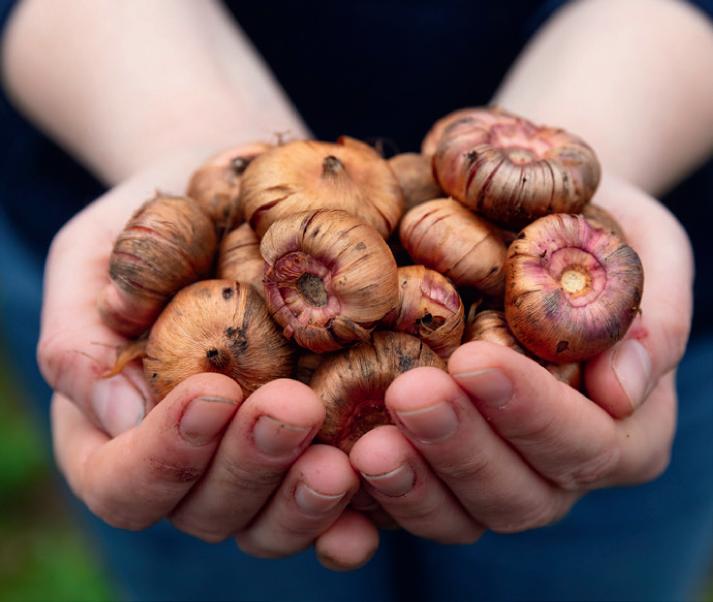
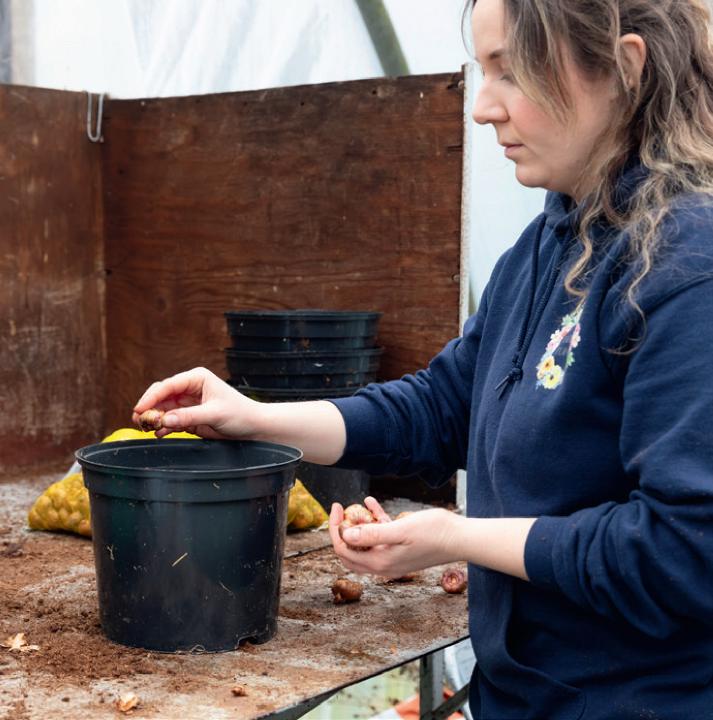

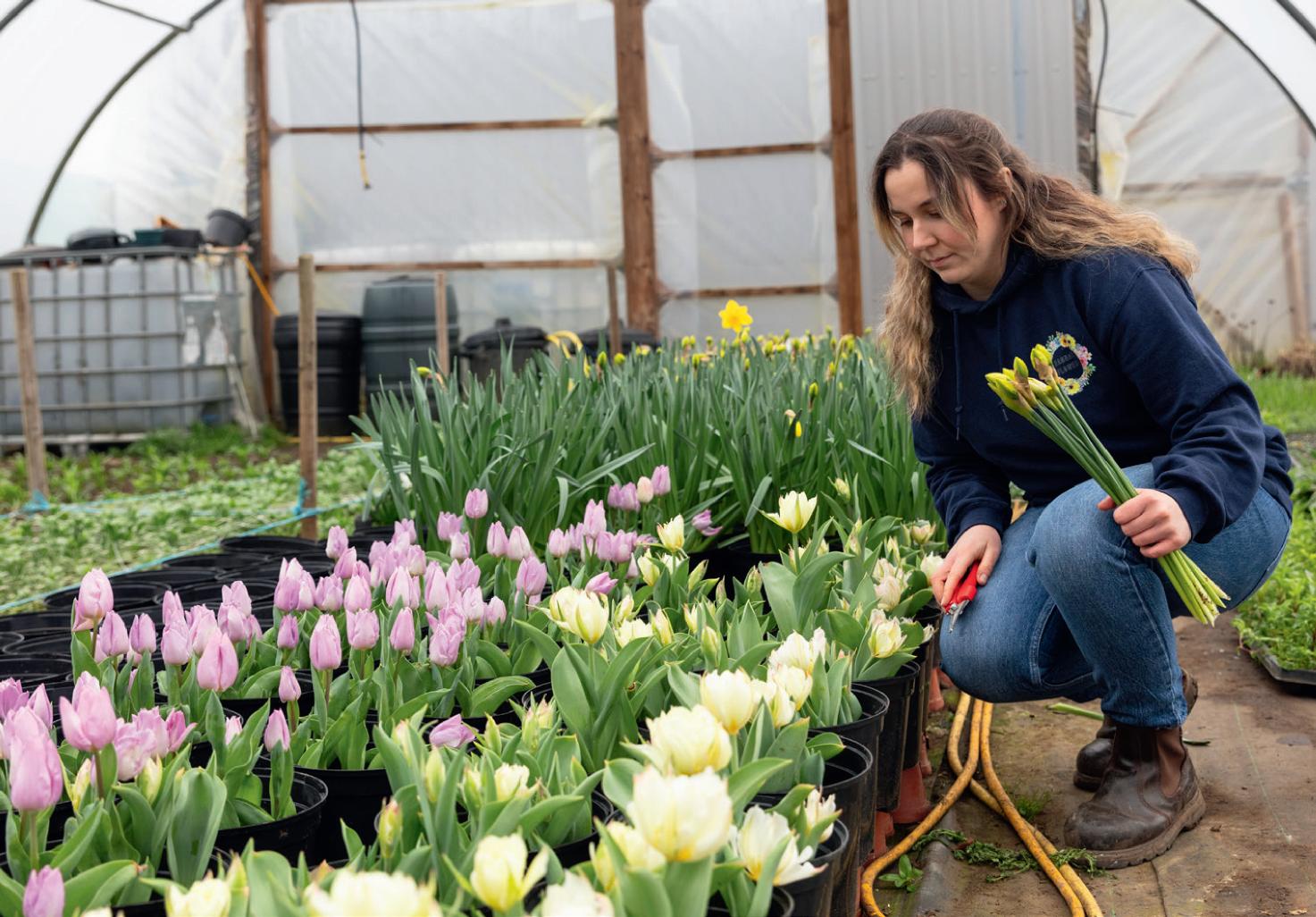


May 2024 20
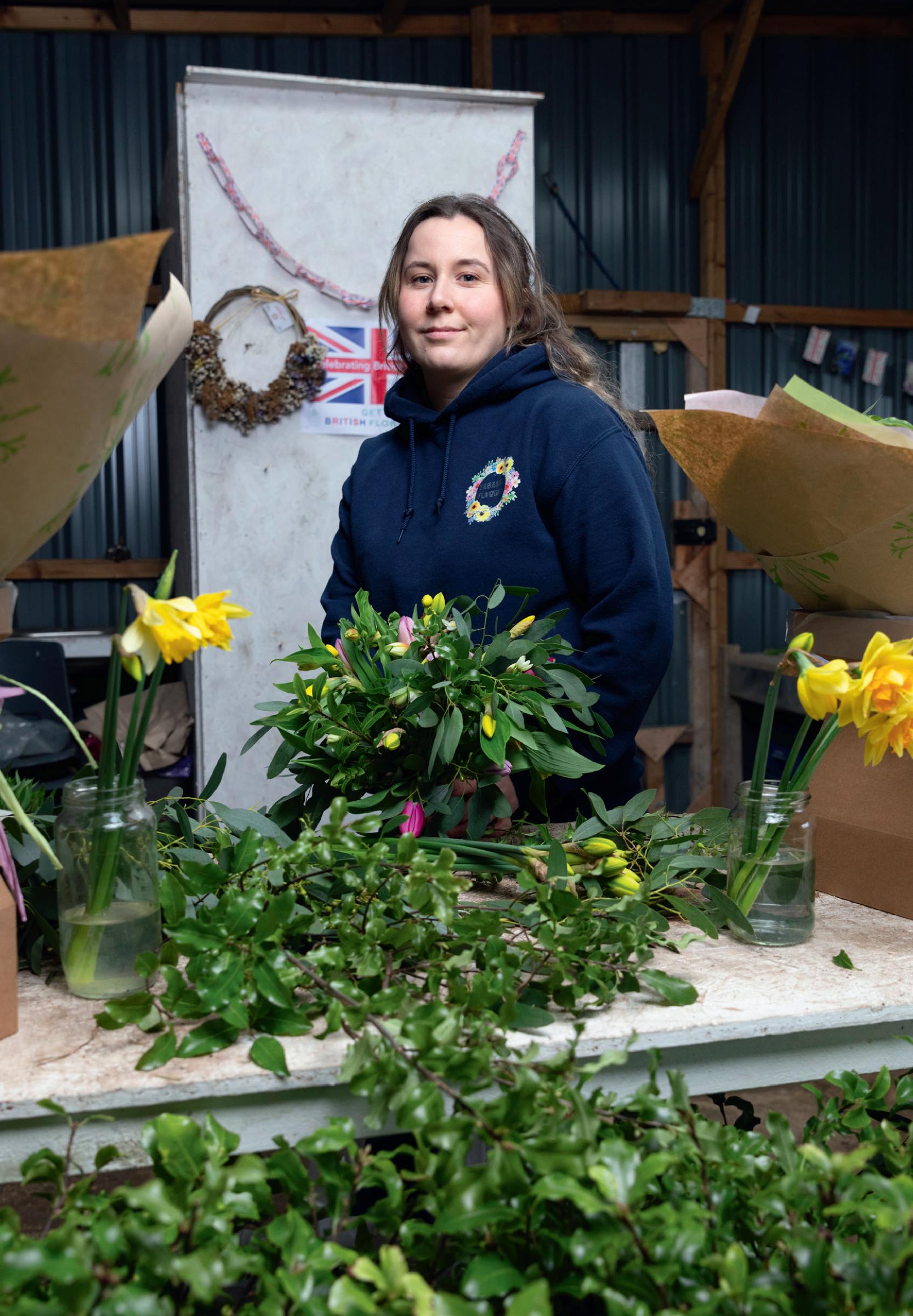
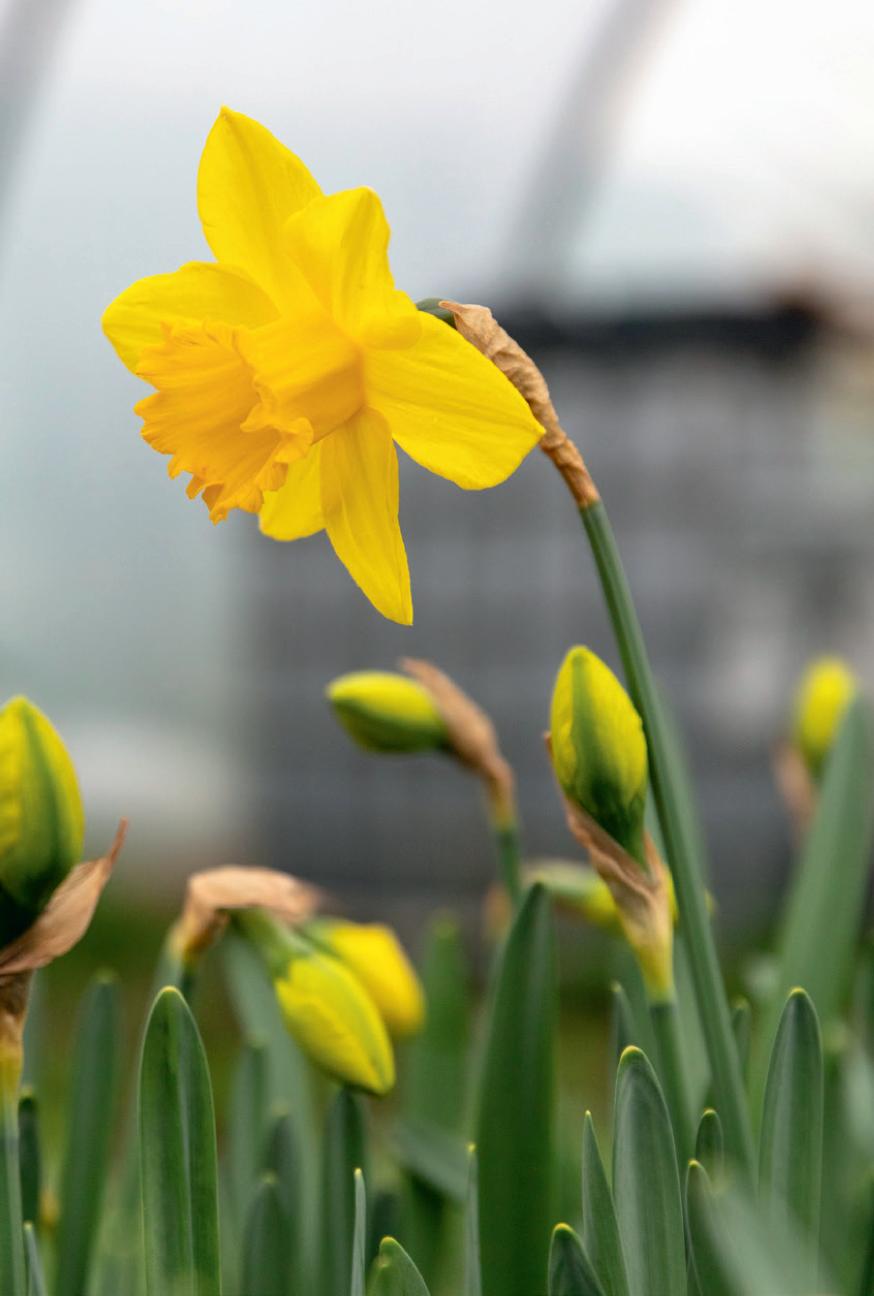
as well as production horticulture and to educate the next generation about a career in the sector.
“I’m really passionate about advocating for British cut fower growers and introducing people to the industry who maybe don’t normally see it as a typical farming sector,” she said in her application video for the NFU programme.
“Everybody looks at farming for food, which is perfectly understandable, but sometimes the ornamental sector is overlooked, and we also bring a lot to the table. Cut fowers is quite a proftable sector within farming, agriculture and horticulture and this is a path young people can take.
“I’m really passionate about advocating for British cut fower growers and introducing people to the industry who maybe don’t normally see it as a typical farming sector”
“You have to keep evolving and moving with the trends.”
It’s been a learning curve to get to this point, she adds, and anyone thinking of diversifying into fowers needs to understand it takes more than just a green thumb.
“It takes time, that’s my number one tip,” Hannah says. “It’s not going to happen overnight, and you obviously must work with the seasons and build year-on-year. I’ve been growing since 2015 and it’s taken until now to really establish the crops, the perennials, and not to
mention the customer base.”
The biggest challenge, Mother Nature, is, however, out of your control.
“Like any farmer or grower, you’re dealing with the weather all the time – I’ve experienced both fooding and drought and it’s tough, really tough.
“My other top tip is irrigation. If you’re going to grow fowers, make sure you have irrigation.”
Education is key
As the frst NFU Student & Young Farmer Ambassador in the cut fower sector,
“For me, education is key. I’m really keen to make young people aware of cut fower farming as a career and we do need more young people coming into the sector as it is, predominantly, an older crowd.”
Veg vs fowers
With regards to how fowers difer to veg, Hannah says weather aside, her venture is somewhat easier than her dad’s.
“With veg, people are very specifc as to how they want it to look. There is also lots of washing and packing required and with that comes a lot of expenditure, whereas with fowers, while you still have the same high expenditure is terms of growing, when it comes to harvesting, you just cut the stem, wrap it and sleeve it and then you’re pretty much done. Obviously, it’s more labour-intensive when it comes to putting bouquets together, but for wholesale, it’s much easier.”
Hannah Benson
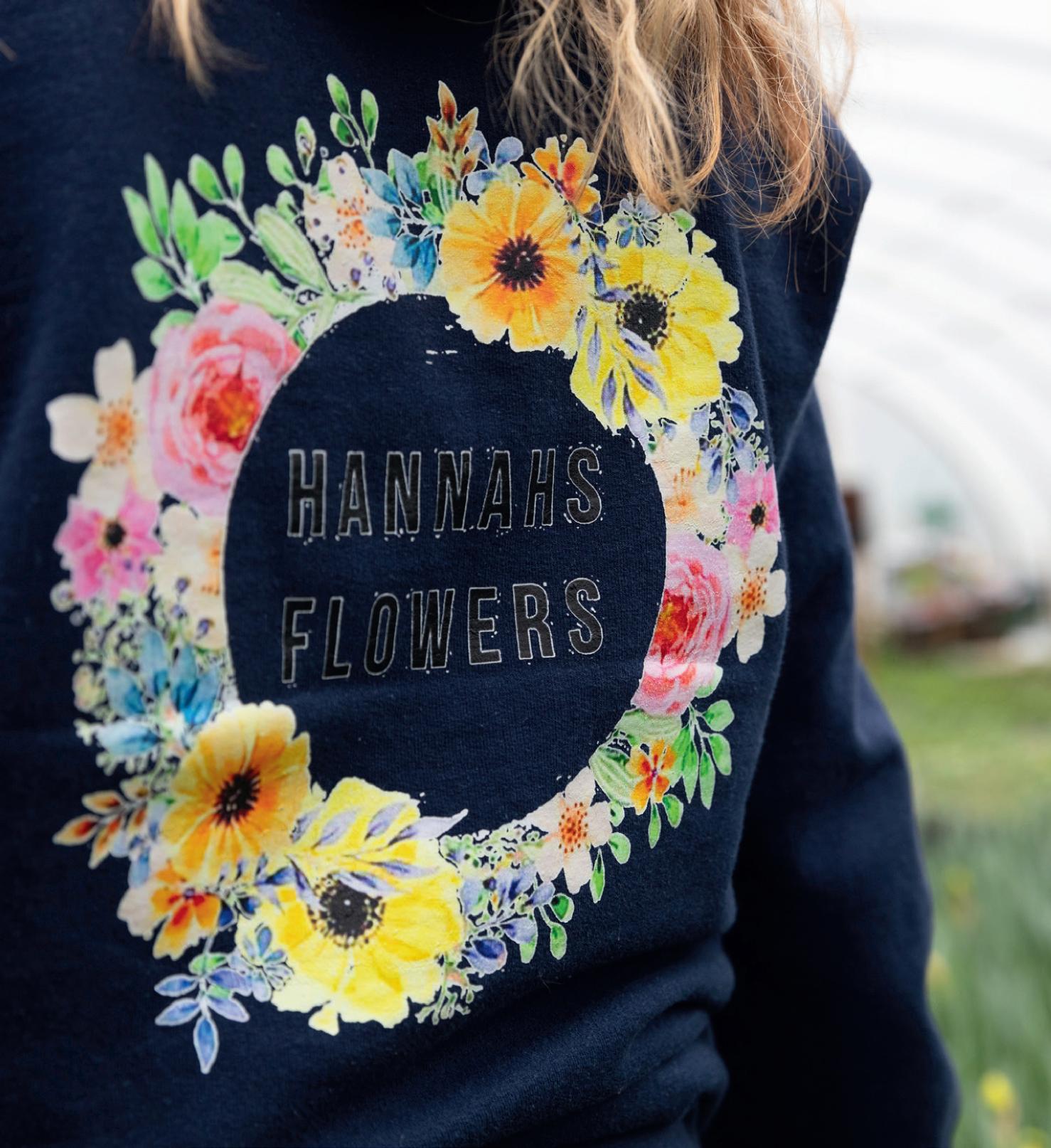
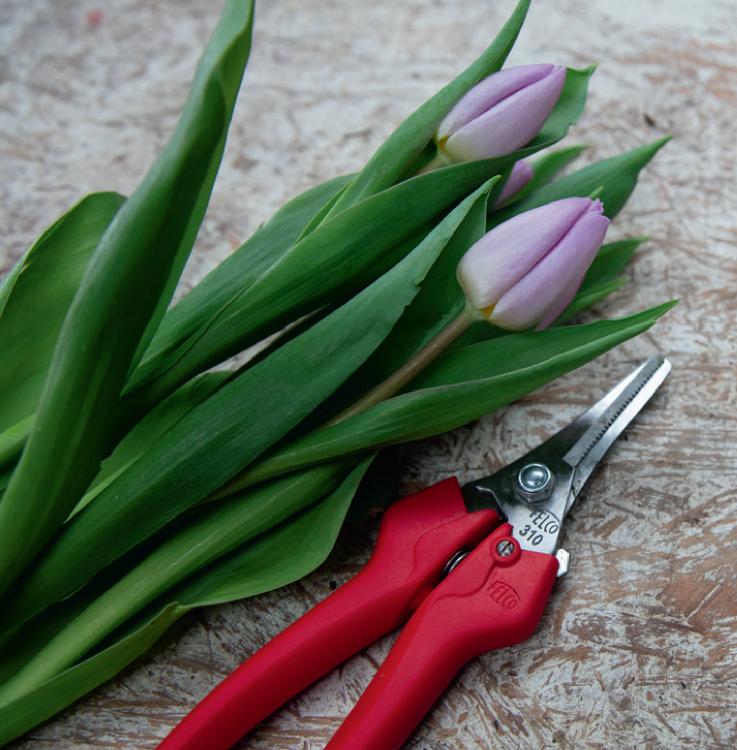

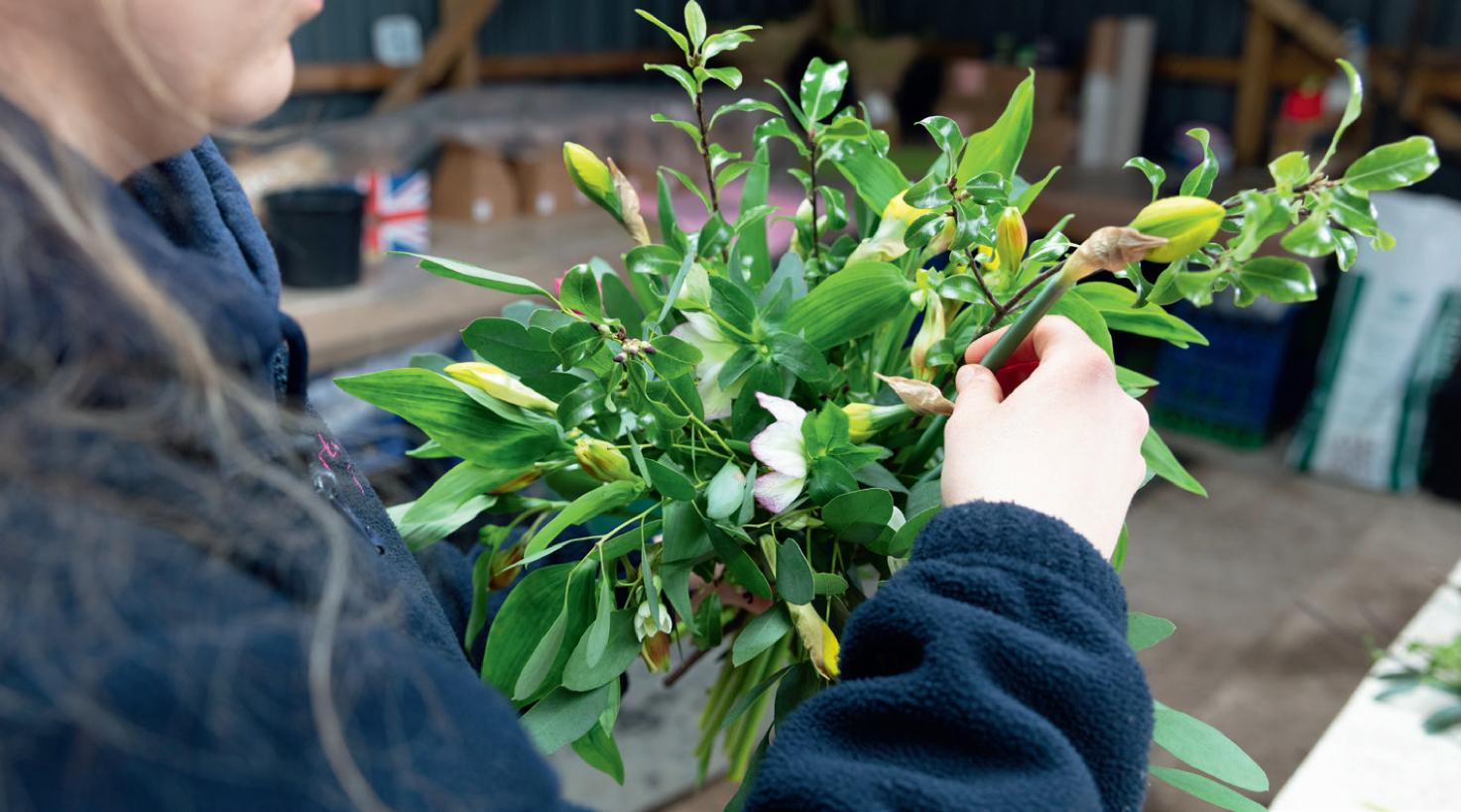
“I hope to continue expanding the business by introducing more varieties of both fowers and foliage while continuing to strive for sustainability”
“A real downside though is that you obviously can’t grow fowers in the dead of winter as you can with veg!”
As to whether she sees further diversifcation away from veg and deeper into fowers in the future, she says only time will tell.
“Dad is very passionate about veg and I’d never want to push him into anything. I have to be respectful because he has allowed me to do what I’m doing with the fowers, but as time goes on, if it’s the case that veg really isn’t pulling through, maybe we will have to get more into fowers.
“The great thing about doing both though, is that growing veg in the winter really bridges the gap when you can’t grow fowers. It might not be a lot, but it tides you over.”
Going for green
In addition to her fower arranging courses, Hannah also plans to diversify into foliage.
“This really is a long-term plan though as it can take up to fve years before you can really cut anything,” she explains. The idea is to ofer traditional things like eucalyptus, pittosporum, laurel, silver birch, and pussy willow, with some more greenery.
“There’s a real market for it as not many British growers do it, but I need to do some serious research and see what will work here. I’ve already got things like spruce and eucalyptus going so it’s just a case of building on that.
“My other goal is to branch out and potentially supply throughout the country with a foliage postal service. This will make it much easier for forists and other similar businesses to be able to make more sustainable buying choices when it comes to foliage.
“I hope to continue expanding the business by introducing more varieties of both fowers and foliage while continuing to strive for sustainability.” P
Hannah Benson May 2024 22



•Advanced CropModules
• BASIS Crop Protection
•Advanced Soil Modules
• BASIS Soil and Water Management
•BASIS Crop Protection
• BASIS Quality of Soils
•BASIS Foundation Award
• BASIS Foundation Award
•FACTS
• FACTS
• BETA/SLM


•BETAConservation Management
•Waste to Land
• BASIS Advanced Potatoes
Polly White
Telephone: 01522 835083
Email: powhite@lincoln.ac.uk 07785 118611

May 2024 23
NFU Conference 2024

The story of NFU24
#NFU24
trended on X by 6am on the opening morning, and stayed in the top 15 for 12 hours
NFU Student & Young Farmer Ambassadors were front and centre at NFU Conference 2024, talking to press and reporting live on social media. We get their thoughts on both days and go behind the scenes at NFU24.
Our 2024 Student & Young Farmer Ambassadors hit the ground running at their frst in-person event.
NFU Conference took over Birmingham’s ICC on 20-21 February, with the event exploring the theme ‘British food: What plan for the future?’.
As part of the agenda, the ambassadors saw Prime Minister Rishi Sunak address delegates, attended their choice of sector breakout session, and were able to say goodbye to Minette Batters after her six years as NFU President. We counted three standing ovations during NFU24 as members demonstrated their appreciation for her leadership.
NFU24 also saw the appointment of a new ofceholder team, with Tom Bradshaw as President, David Exwood as Deputy President, and Rachel Hallos as Vice-president.
Unsurprisingly with all that excitement, the event proved a record year for media coverage. Naomi Williams-Roberts and James Scott shared their thoughts on government support on BBC Newsbeat. James also featured on a Farming Today NFU Conference special, alongside Sophia Ashe, Jon Watt and Ben Chilman.
For more on NFU Conference 2024 go to nfuonline.com/nfu24
What the ambassadors thought

James Scott
My frst NFU Conference was a really positive experience. It was great to see so many people in a room who showed a clear passion for agriculture and the ways they can improve farm businesses while remaining sustainable. I also found it good to see how they are recognising everyday struggles in life for farmers. This was supported by a lot of awareness raised about mental health in farming – particularly, the huge £18,500 raised for RABI during dinner.
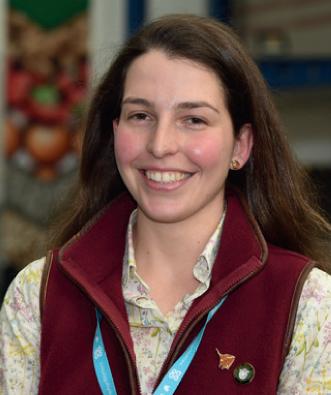
Sophia Ashe
The successful introduction of the Sustainable Farming Incentive (SFI) was a largely discussed topic. However, there must be developments in the SFI with food production in mind. I believe this will come in good time, but it is important that producing food while protecting the environment – not sacrifcing food security in order to – is central to the scheme. Application criteria also need addressing, particularly for new entrant farmers who may be unable to apply to schemes due to not having been under BPS previously.
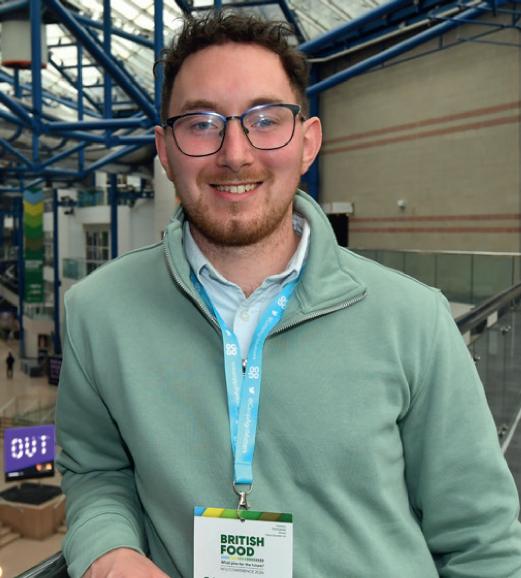
Ed Harrison
It’s clear the industry faces many challenges; the weather, food security, reducing emissions and protecting the environment, to name a few. These challenges, however, met with optimism and positivity, ofer opportunities to showcase British farmers and the way we farm. The fascinating presentation by Jack Bobo really showed this, with his positive outlook saying we are doing well but let’s do better and instead of just what we should do, let’s imagine what we could do.
COVER STORY May 2024 24

Jon Watt
I thoroughly enjoyed my frst NFU Conference. Highlights were Jack Bobo’s talk on ‘British Food Systems in the Global Context’, the Prime Minister’s speech and speaking to Farming Today and BBC Newsbeat. It was also a real privilege to share Minette Batters’ last conference as NFU President as she has been a huge inspiration to me and has done a tremendous amount of good for British farming. I do, however, wish that the politicians present had made manifesto commitments on farming policy which, in an election year, is so important to our future.

Magnus Brown
NFU Conference; a whirlwind of farming policy, Westminster politics and fabulous speakers. Food security is now clearly at the forefront of all political parties’ agendas in this election year. An experience very diferent to those previously; now in my role as an NFU Student & Young Farmer Ambassador, we were able to share our views and stories to media giants on the radio and TV. They were two days I’ll never forget.
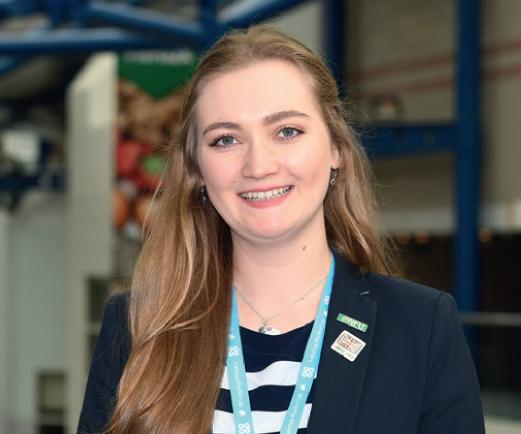
Jessica Stewart
With a visit from the Prime Minister, it is clear to see the importance of the farming vote and it is refreshing to see that agricultural policy is, and should be, a top priority for any incoming government. There was a focus at Conference on improving the balance between food security together with environmental aims, which representatives from across the board appeared to recognise.
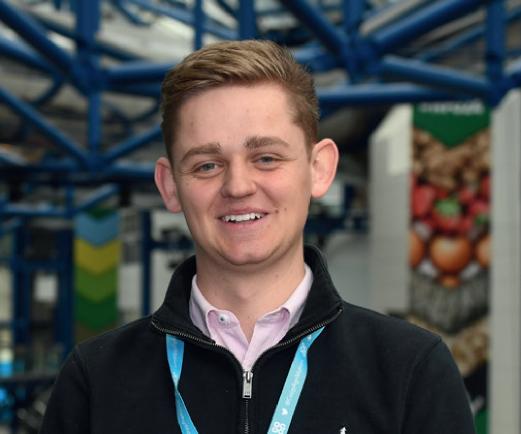
Ben Chilman
Hearing Minette’s fnal speech as President was a very poignant moment. She has been a superstar of agriculture, putting farming and the NFU at the forefront of conversation in the mainstream media and rightly received standing ovations after injecting some much-needed positivity into an industry that is currently at a crunch point between balancing the environment and food production.
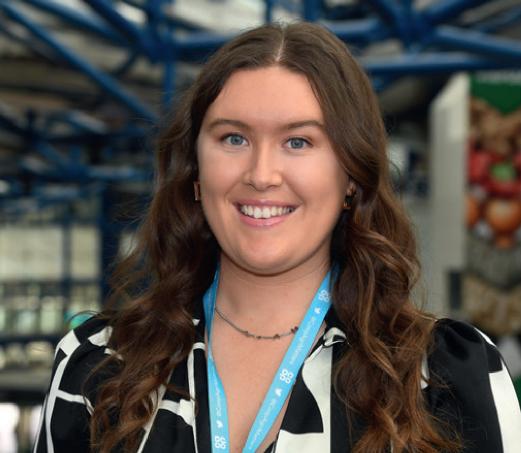
Sian Grove
The highlight for me was Minette Batters who opened and closed Conference with a brilliant and heartfelt address, which resonated with every single person, and, as such, was well deserving of not one, but three standing ovations. Being her last NFU Conference as President, it was incredibly emotive and powerful to see and experience. I was also delighted to do an Instagram takeover for the NFU Student Farmer account, keeping everyone updated. A fantastic couple of days!
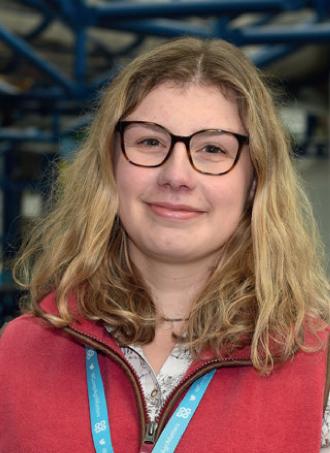
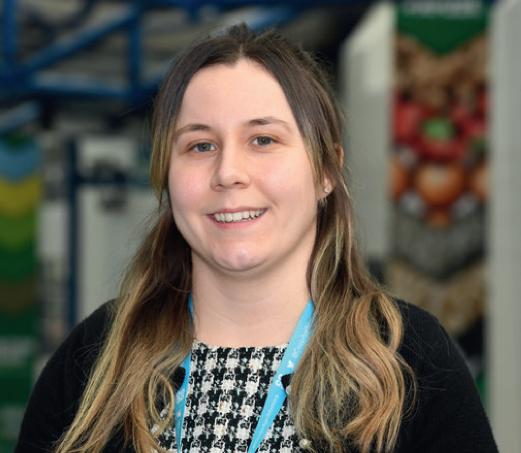
Hannah Benson
As a grower who has faced fooding challenges, and after hearing from the EA chairman during Conference, more needs to be done – particularly if we are expected to see increased rainfall due to climate change. On a positive note, it was great to hear Conference emphasise fairness in the supply chain because, as a younger person who has diversifed into ornamentals from fresh produce, it gives me hope I can continue to successfully farm both in the future.
Molly Mead
It was encouraging to hear that tackling bovine TB remains a top priority for the NFU. This was emphasised in Minette’s opening speech and in the livestock commodity session. Given the persistent challenges faced by cattle farmers with little sign of progress, it's reassuring to hear the NFU is actively working on improving strategies to combat the disease. Their support for badger culling, where deemed necessary, really refects their dedication to fnding an efective solution to eradicating bTB.
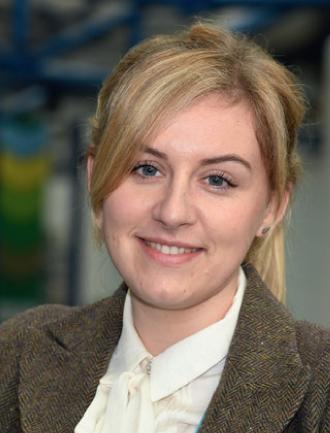
Naomi Williams-Roberts
The NFU Conference atmosphere was electric. There isn't anything quite like a room full of farmers all unifed by their passion for the industry and way of life. Despite the size of NFU24, it still feels very intimate. It's a great refection of the NFU itself and how it functions. Getting a picture with Minette will stay with me - she's a role model, and has led the way as an unapologetic force who fghts for what she believes in!"
1,478 people registered to attend Conference on day one
1,244 people registered to attend Conference on day two
442 Pieces of national coverage featuring NFU mentions
£18,500 was raised for RABI during the Conference dinner
1,172 steak fllets were served during dinner, along with 840 bottles of wine
7,000 teas and cofees were served during the two days of the event
NFU Conference 2024
May 2024 25
NFU CONFERENCE IN NUMBERS
GREATCAREERS BEGIN AT REASEHEATH








Couldyou shapethe future of sustainablefoodproduction whilealsolooking afterthe health of theplanet? Becomean agriculturestudentatReaseheathCollege or University Centre Reaseheath andwe’ll show youhow!


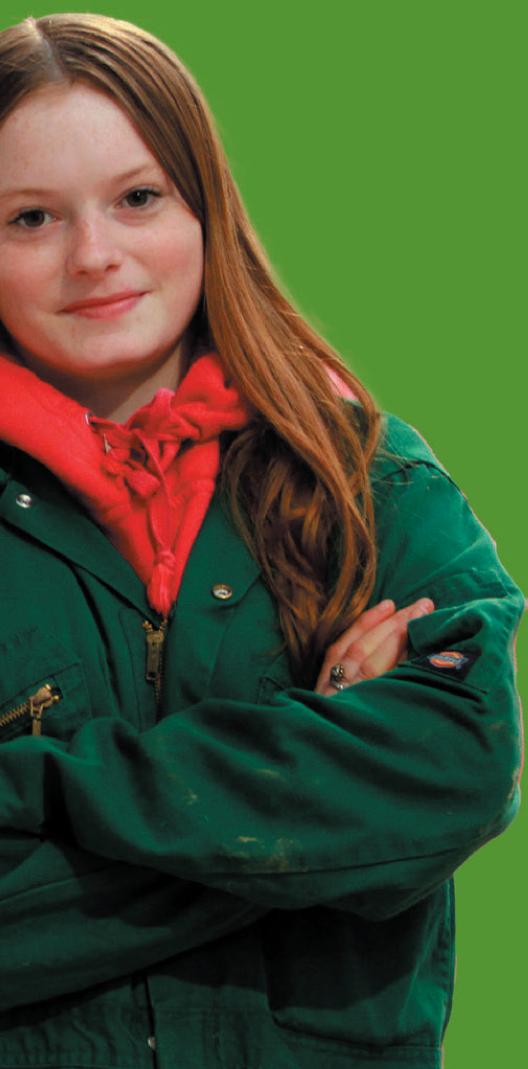
Ourindustr yfocused courses, technical innovation,expertteachingstaff,dedicationto ensuringyou become career ready, andfantastic social life arejustsomeofthe reasons whyour students love studying with us!
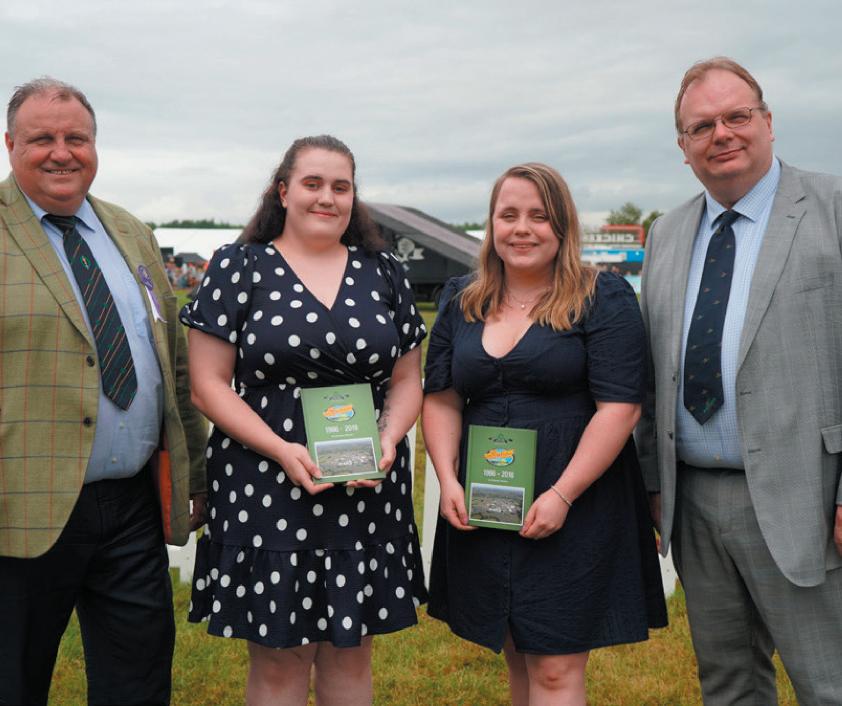
JOIN US FOR OUR NEXT OPEN DAY
Reaseheath College &UniversityCentre Reaseheath 8thJune 2024
UniversityCentre Reaseheath Virtual Open Day 16th May2024
Don’t miss our

12th MAY
TheJohnPlattTravelScholarship is in memory of John Platt, aformerChair of Reaseheath Governors andformer Chairman, President andHonoraryLife Warden of theCheshireAgricultural Society. It’sopen to anyone aged 18 –35livingor working in Cheshire’sagricultural sector.
EmmaPendlelbury(left)and Niamh McGrath receivetheirJohnPlattTravelScholarshipsf rom CheshireAgricultural SocietyTreasurer Keith Thomas andReaseheath’s Principaland CEOMarcus Clinton at theRoyalCheshire CountyShow.
May 2024 26
Interested? Apply now for2024
www.reaseheath.ac.uk/agricultural-careers
Travel scholarship for ambitious agriculturists
Here we turn the spotlight on alumni Niamh McGrath and Emma Pendlebur y who are using travel to build up their knowledge and further their careers.
Last yeartwo ambitious former Reaseheath College agriculturists were awarded achance forglobal travel thankstoascholarship run by Reaseheath in partnership with the CheshireAgricultural Society.
Niamh McGrath, afnalyearBSc (Hons) Degree in Agri Food Marketing with Business undergraduateat Harper Adams University, andEmma Pendlebury, co-manager of acontract calf rearingunit, were each awarded £2,000 John PlattTravel Scholarships to fundinternational research whichhas the potential to improve proftabilitywithin Cheshire’sfarming community.
Niamh, 24,who completed Level 2 andLevel 3Diplomas in Agriculture at Reaseheath, has already enjoyed an enlighteningtriptothe USA while Emma, 22,aformerLevel 3Extended Diploma in Agriculturestudent,is completingfnalarrangements fora tour of NewZealand. Heretheytell us whytheyapplied forthe scholarship andwhat they hope to achieve.
What’sthe plan?
Niamh:
“I wanted to visit theUSA to investigatethe impactofmarketing dairyproducts nationally and regionally through theindustryled “Checkoff” programme, which

provides research,education and promotion foragricultural commodities without referencing specifc producers or brands.
“This scheme has been very successful at informingthe buying public about thevalue of food products, particularly those whichare localtothe area, andI wasinterested to see whether it would be viable to introducea similar approach in theUK.
“I spent three weeksinMadison, Wisconsin, learninghow thescheme operates and gaininganunderstanding of its value, andthenattended a‘Women in Agri Business’ conferenceinNashville.”
Emma:
“It’sbeen my ambition formanyyears to visit NewZealandand learnmore about the calf rearingsystems there. I’m particularly interested in disease management in thepre-weaningto post-weaningstages.
“I’ll be spendingfour weeksonboth North andSouth Islandvisiting 20 farmswith different units, breeds and feed systems, consulting with vets, and shadowingfeed reps. The supportfor my projecthas been overwhelmingand I’m havingtrouble fttinginall theoffersI’ve received!”
What do youhope to achieve?
Niamh:
“I felt that“Checkoff ”was unlikely to be applicable to the UK,asthe programme operates across large geographical areasand needsanextensivelevel of resources. Also,there’s already alot of consumer supportfor American grown andbredproduce.However,I did gain a heightened awareness of international operations within thefoodand farming sectorwhichwillberelevant to all UK businesses.”
(Left) Niamh McGrath at aWomen in Agri Business conference in theUSA (Right) Calf RearingCo-Manager Emma Pendlebury
Emma:
“I’m very interested in thescientifc evidence surroundingnutrition and medication andI’m hoping that my research will help Cheshirefarmers to improvehealthand welfare, lower mortality, decrease medication and maximise profts. It’simportant that calves get thebeststartinlife, preferably with adedicated calf rearer,astheyare theherd’sfuture foundation.”
On apersonal level?
Niamh:
“The whole experiencehelped me to grow in confdenceand independence andwas agreat addition to my CV. The trip pushed me out of my comfort zone andtaught me theimportance of travel. In thefuture, Iwould love to continue to travel andbuild up my knowledge of international agricultural practices.”
Emma:
“Beingawarded this travel scholarship wasanamazingachievement for me andI’d liketothank Reaseheath College andthe CheshireAgricultural Societyfor giving me thisopportunity. In thefutureI’d liketobecome a consultant andbeable to sharemy knowledge within thewider farming community.”

Reaseheath College ADVERTISEMENT FEATURE
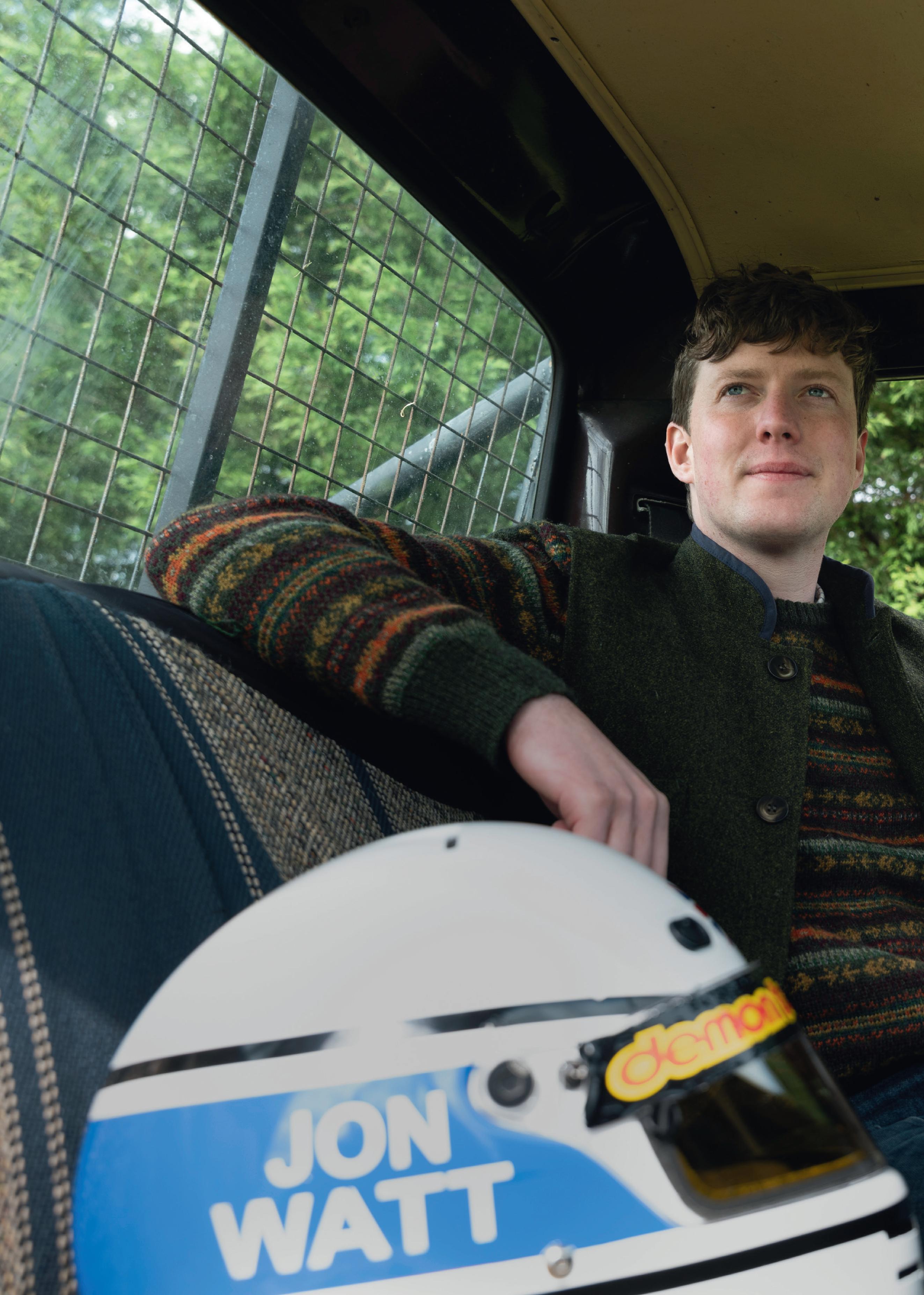
Start enginesyour
An NFU East Student & Young Farmer Ambassaor, and race car driver turned farmer, Jon Watt shares his journey back into farming as he prepares to launch a new beef box scheme
May 2024 28
Simon Buck
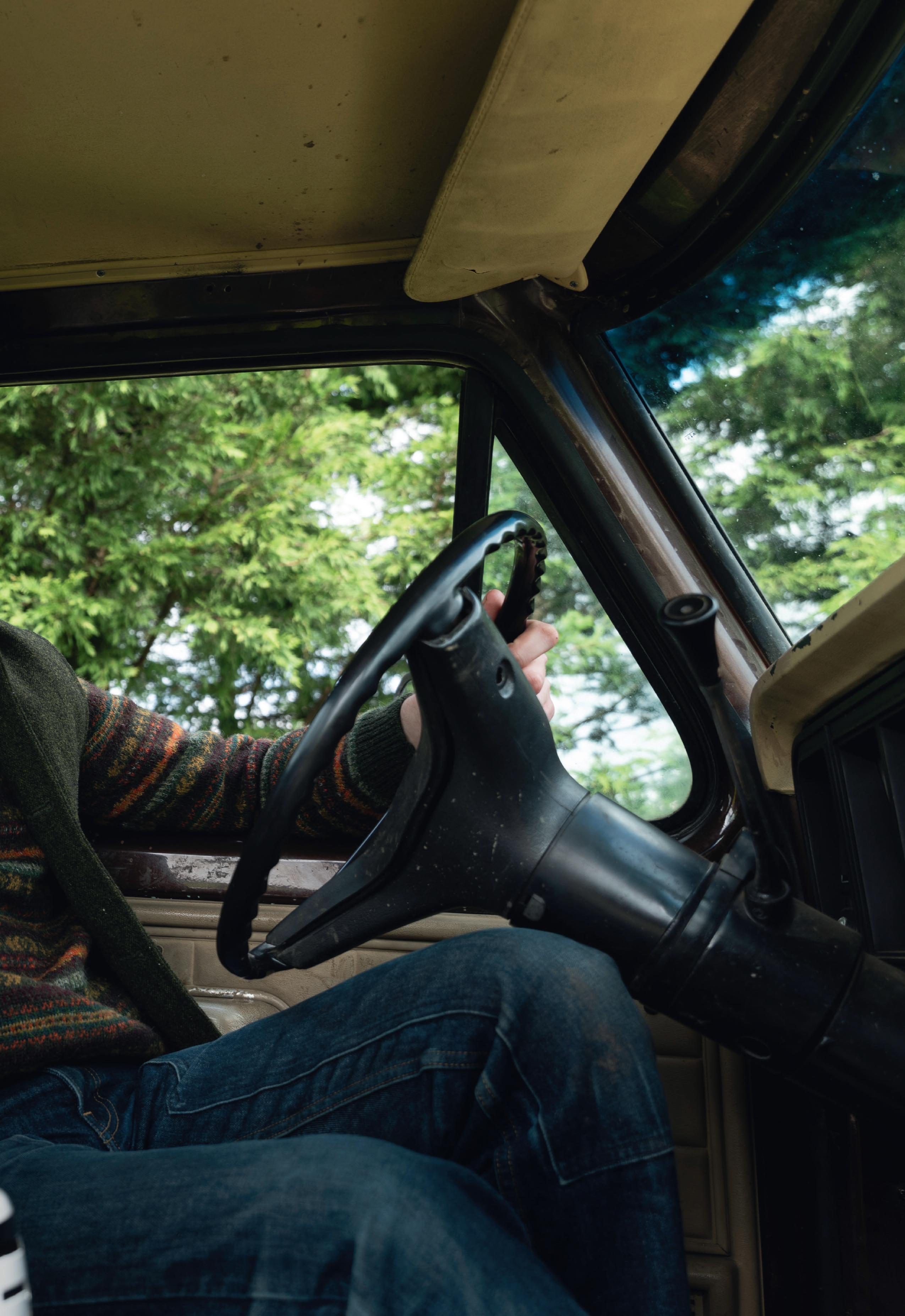
Since last writing anything I have swapped the carbon six-point harnessed seat of a race car for the air seat of a tractor cab. I grew up on the farm but left to go to university, studying engineering and going into motor racing. I actively competed from 2014-2020, occasionally winning something, sometimes bouncing of the scenery and most of the time fnishing somewhere in the middle, before returning to farming in 2020.
The past few years have been an incredible journey back into farming. Having grown up doing it, I sort of assumed I knew how to farm, but there’s a big diference between being told by your dad to drill that feld today and making the decision yourself.
The fact that everything in farming seems to be changing has also intensifed the learning curve for me. The removal of BPS and the new Sustainable Farming Incentive (SFI) scheme are changing rotations and, while presenting challenges, are truly exciting as change is what presents opportunity. In the past year, we have been trying a lot of new things and the weather has been challenging to say the least.
Jon Watt
COVER STORY May 2024 29
Jon Watt
“I believe keeping a pedigree native breed will help with the beef box sales as its gives us a unique selling point. I hope the smaller size and ability to thrive on forage-based diets will be useful for herbal leys and grazing cover crops. The reputation for producing the best tasting meat helps too!”
Autumn drilling went okay until Storm Babet was forecast. I drilled for 23 hours straight, putting in a wheat and beans bicrop to get ahead of the weather. Unfortunately, it started raining and never stopped. By the weekend all the local farmers were out on tractors rescuing schoolchildren, doctors, nurses and towing cars out of foods. To give an indication of how deep the fooding was, some roads became impassable to even the biggest of tractors. This did the wheat no favours as a large percentage ended up in a heap at the bottom of the feld. Predictably, this last drilled feld is right next to the road. I’m hoping the frst dose of spring nitrogen and wheat’s remarkable survival traits mean things look better soon!
Time for change
A few years ago, I decided I wanted to diversify and keep cattle. Firstly, they are my favourite animals and I feel you are only going to make a success of something you are truly passionate about. Secondly, at the time we were not farm assured which made selling the cereal crops challenging so a good solution was to feed them to the cows, we also had straw from the crops, so they slotted in nicely.
This year, we have also started growing
for WildFarmed – an incredible company run by Andy Cato focused on regenerative cropping. One of their key standards is integrating livestock into the rotation. If you haven’t heard of them, they are well worth looking into. The four they produce is then sold to some wonderful bakeries across the country, making all sorts of very delicious sourdoughs and pastries. They also believe in paying a fair and premium price to reward the farmer for the work put in and this certainly appealed.
So, what with that and the new herbal leys ofer in the SFI, the cows seem to really stack up as a viable arable ‘break’ crop. By the time this goes to press, the frst cattle will have gone to slaughter and we will then have some clue as to whether this has been a proftable idea. I’m hopeful! I’m also keen to try out beef boxes. I think with the lack of fairness in the supply chain generally in agriculture any opportunity you can take to capture more value out of your produce is good. I also believe in short supply chains of good local food so building up the customers and restaurants, as well as our brand, will, I think, stand us in good stead for the future.
As part of this venture, I have recently purchased some additional Red Poll and Hereford pedigree cows and calves from
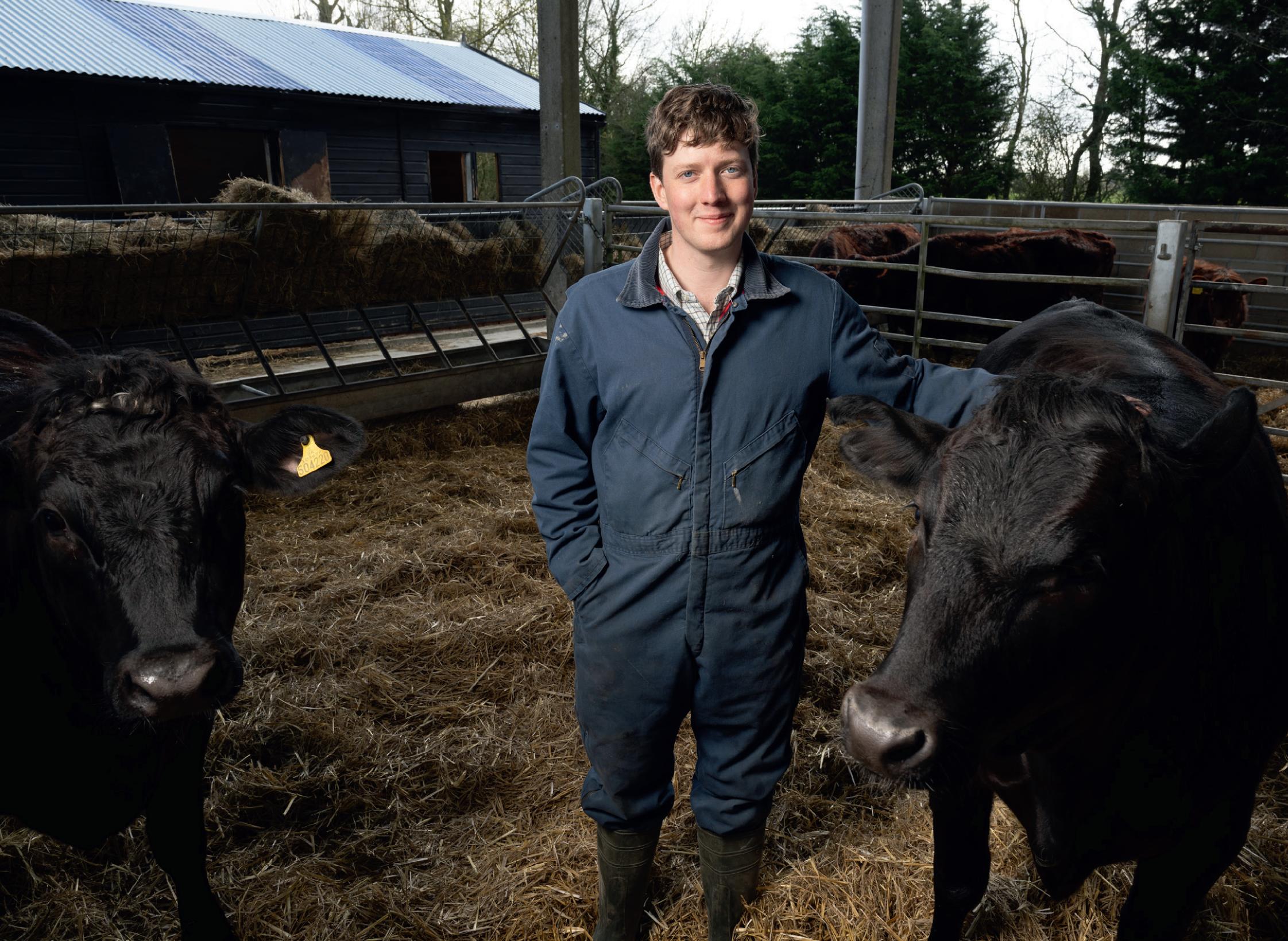
May 2024 30
a farm near Cambridge. I believe keeping a pedigree native breed will help with the beef box sales as its gives us a unique selling point. I hope the smaller size and ability to thrive on forage-based diets will be useful for herbal leys and grazing cover crops. The reputation for producing the best tasting meat helps too!
Speaking of cover crops, we have been experimenting with these as well this year, ahead of the spring barley. We have grown mustard and radish and a more diverse mix of phacelia, buckwheat, vetch and radish. The phacelia, mustard and radish have done well and will form the basis of future years’ cover cropping.
I have to say I’m staggered by the efect they’ve had on the soil. The mustard and radish have rooted deeply and considering the quantity of rain we’ve had they have allowed the water to infll and there is no run-of erosion. They produced a wonderful friable tilth which I’m really hoping will direct drill well. Cover cropping will defnitely form the basis of future rotations.
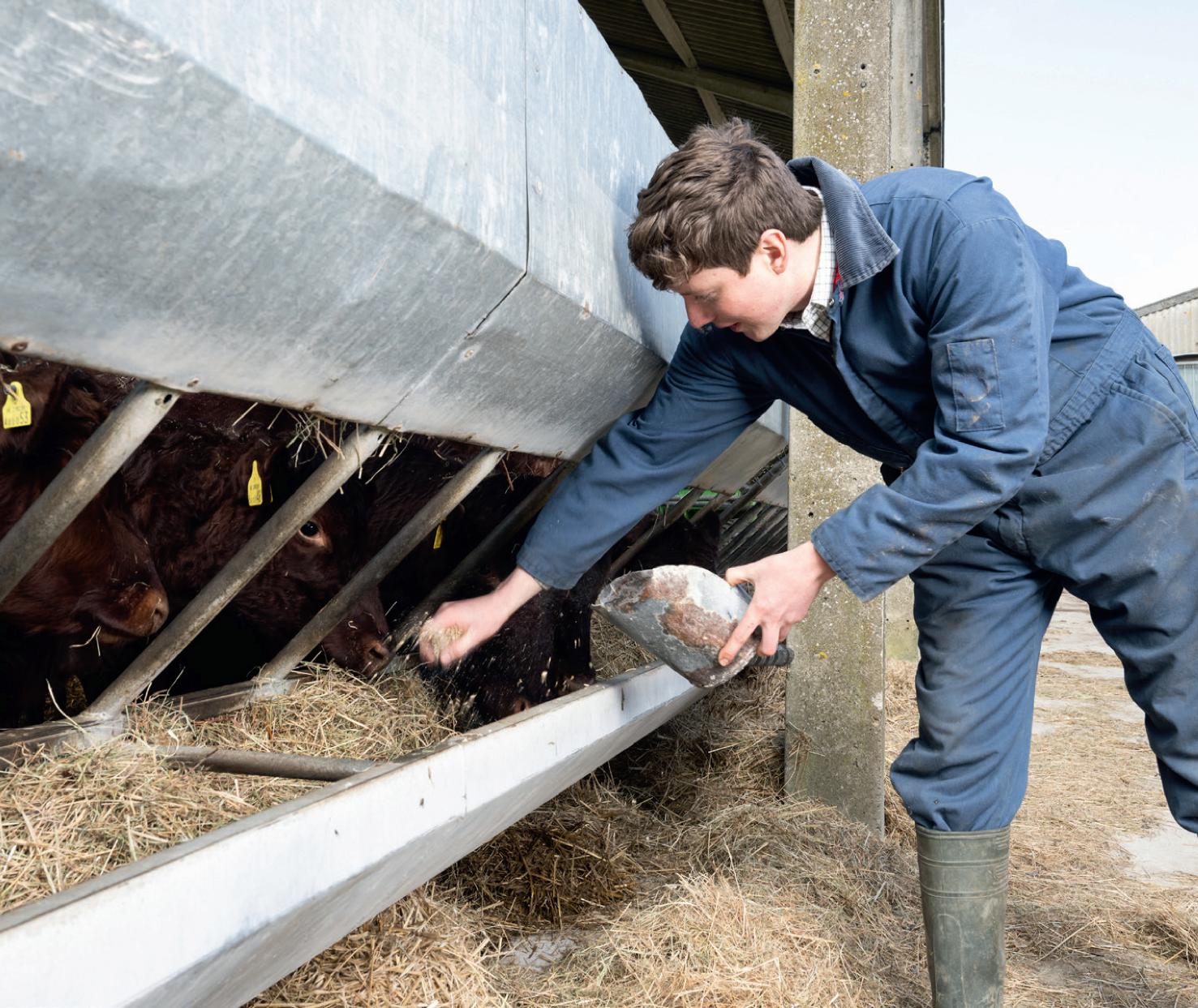
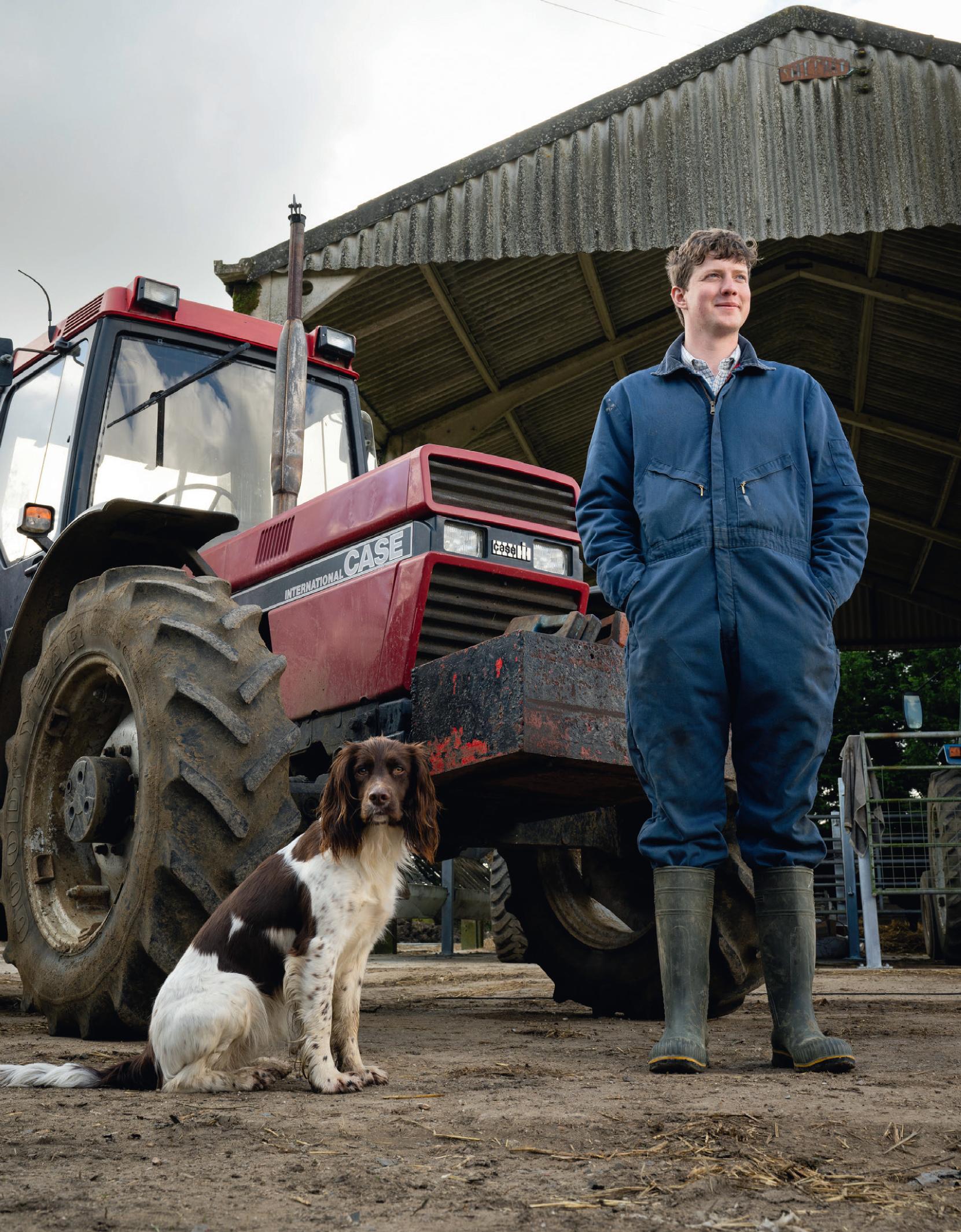
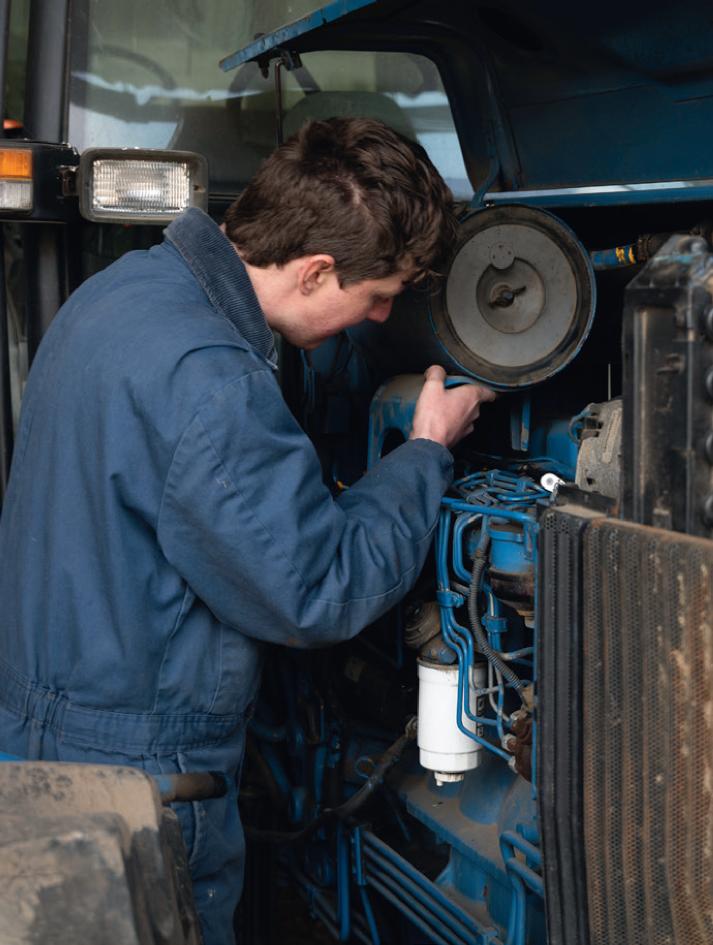
We’ve been planting hedges too, some at home and some as contracting work. All in all, it added up 1.6km and more than 9,000 new plants. I love the fact that you get paid to plant new hedges and I genuinely think Sufolk will be transformed in 10 years’ time. It is, however, very hard work, but I had two very good guys working for me and we could average more than 1,000 plants a day. All I can say is, you don’t need a gym membership when planting hedges. As the year progresses, along with my new role as an NFU Student & Young Farmer Ambassador, I hope to try some direct drilling, we are helping to plant a vineyard and the new suckler cattle will arrive, so its going to be an exciting year ahead. P
May 2024 31
Jon Watt
Things to do...
Things to do…
Looking for something to do over summer? NFU Graduate Rhys Felton shares his pick of the top events.
APRIL 2024
27 April
Gin and Rum Festival
Bristol City Hall
Tickets: £16 ginandrumfestival.com
MAY 2024
2 May
Rhod Gilbert & The Giant Grapefruit
The Lowry, Salford Quays
Tickets: £39.50 thelowry.com
11 May
Nottinghamshire County Show
Newark Showground
Tickets: £13 nottinghamshirecountyshow.com
16-18 May
Devon County Show
Westpoint, Clyst St Mary
Tickets: From £20/ day devoncountyshow.co.uk
17 May
Hartpury Summer Ball
Hartpury House
Tickets: £60 estore.hartpury.ac.uk
5 - 7 JULY
KENT COUNTY SHOW
19 May
Essex Young Farmers Show
Boyton Hall, Chelmsford
Tickets: £16 essexyoungfarmers.com/yfc-show
19 May
Women’s T20 Cricket: England vs Pakistan
Headingley Stadium, Leeds
Tickets: From £15
tickets.yorkshireccc.com
25-26 May
Hertfordshire County Show
Hertfordshire County Showground
Tickets: £24 / £20 student hertsshow.com
30 May – 1 June
Royal Bath and West Show
Bath and West Showground
Tickets: From £15/ day bathandwest.com
JUNE 2024
6-8 June
Royal Cornwall Show
The Royal Cornwall Events Centre, Wadebridge
Tickets: From £11.50/ day royalcornwallshow.org
7-11 AUG
BOARDMASTERS FESTIVAL

9 June
LEAF Open Farm Sunday
Farms across the UK
Tickets: Free farmsunday.org
11-12 June
Cereals: The Arable Event
Bygrave Woods at Newnham Farm, Hertfordshire
Tickets: Free for NFU members cerealsevent.co.uk/the-show
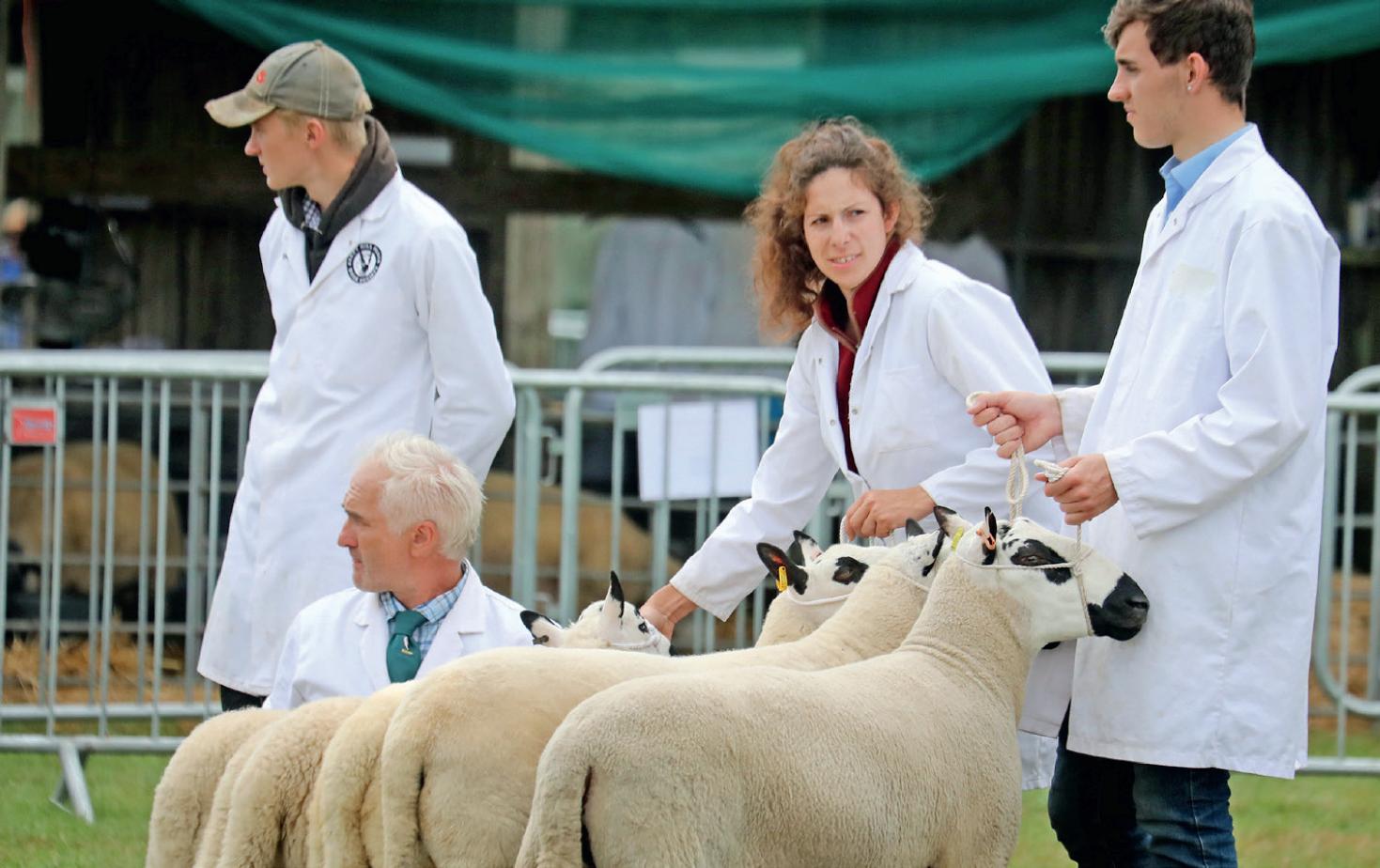
14-16 June
Royal Three Counties Show
Three Counties Showground, Malvern Tickets: £23/ day royalthreecounties.co.uk
14-16 June
Download Festival
Donington Park
Tickets: From £267 downloadfestival.co.uk
22-23 June
Africa Oyé: African music and culture festival
Sefton Park, Liverpool
Tickets: Free africaoye.com
May 2024 32

JULY 2024
5-7 July
Kent County Show
Kent Showground, Maidstone Tickets: £22/ day kcas.org.uk/kent-county-show
9-12 July
Great Yorkshire Show
Great Yorkshire Showground, Harrogate Tickets: £35/ day greatyorkshireshow.co.uk
12-14 July
Wireless Festival
Finsbury Park, London
Tickets: From £94.60/ day wirelessfestival.co.uk/tickets/
20 July
London Athletics Meet
London Stadium Tickets: From £23 britishathletics.org.uk
22-25 July
Royal Welsh Show
Royal Welsh Showground, Builth Wells Tickets: £32/ day rwas.wales/royal-welsh
26-28 July
The Game Fair
Blenheim Palace thegamefair.org
Members use code 'NFU10' for 10% of
27 July
Depot in the Castle Cardif Castle
Tickets: From £61.60 depotcardif.com
AUGUST 2024
3 August
Just the Tonic Comedy Club
Rosies, Birmingham Tickets: £16 justthetonic.com
7-11 August
Boomtown Fair Festival
Matterley Estate, Winchester Tickets: From £300/ weekend boomtownfair.co.uk
7-11 August
Boardmasters Festival
Newquay, Cornwall
Tickets: from £94.50/day boardmasters.com
16-18 August
Longines Global Champions Tour
Royal Hospital Chelsea, London Tickets: TBA gcglobalchampions.com
25 – 27 August
Reading and Leeds Festivals
Richfeld Avenue, Reading / Bramham Park, Leeds
Tickets: £125/ day, £325/ weekend readingandleedsfestival.com
29 August – 1 September
End of the Road Festival
26 - 28 JULY
THE GAME FAIR
Members use code 'NFU10' for 10% of

Larmer Tree Gardens, Wiltshire Tickets: £255/ weekend endoftheroadfestival.com
SEPTEMBER 2024
5 – 8 September
Defender Burghley Horse Trials
Burghley House, Lincolnshire
Tickets: TBA burghley-horse.co.uk
7-8 September
Dorset County Show
Tickets: £18 dorsetcountyshow.co.uk
Things to do...
May 2024 33
Photos: Sarah Farnsworth, Sophie Harbison and Southern News & Pictures Ltd
Taking on TikTok
Digital Campaigns Adviser Sophie Bird shares the NFU’s TikTok journey so far and her participation in the #SophieAsks series
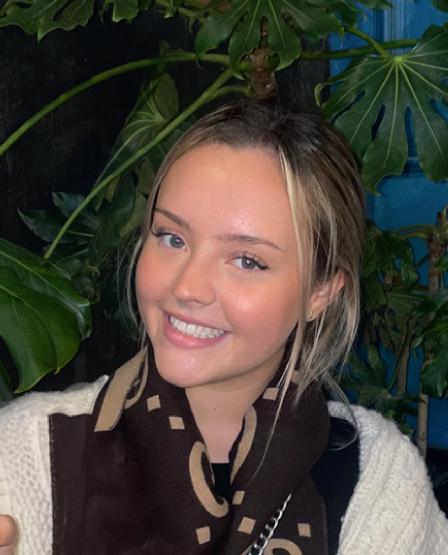






Ayear on from its launch on TikTok, the NFU has posted 124 videos, which have been seen more than 2.1 million times, and have racked up more than 132.6k likes with some 13.5k followers. Just over 70% of our audience is under the age of 35.
The channel was started as part of the NFU’s initiative to connect with a younger audience and teach them about British farming. This came after an NFU survey showed that people under 35 were the least interested in farming.
Surprisingly, our most popular TikTok videos are not those following trends, but those that teach you something about farming, or highlight the issues farmers face, such as flooding or livestock worrying.
The engagement these videos have received proves that people want to learn more about the sector, whether they are learning what wheat looks like, ways to get into farming, that walnuts are grown in the UK, or how they can support farmers and be aware of issues they are facing.
If you’re familiar with @BackBritishFarming_ TikTok, you may have seen a video of me asking Olly Harrison about the pile of wheat in his grain store and saying it looks like sand, or asking Charlie Beaty what a heifer is, or quizzing strangers about their Christmas turkeys while dressed as a turkey in Birmingham city centre... a humbling experience to say the least.
You might be wondering how I ended up on farms asking these questions, and judging by some of the comments, you might even
“Our most popular TikTok videos are not those following trends, but those that teach you something about farming, or highlight the issues farmers face, such as flooding or livestock worrying”
be concerned about my lack of agricultural knowledge. Rest assured; I didn’t actually think the wheat was sand, but I genuinely didn’t know what a heifer was.
After almost a year with the NFU, I too am concerned about the disconnect between those living in the city and their food sources. This is what sparked the idea to have a #SophieAsks series, a concept that involves me, a newbie to farming, asking the first questions that come to mind – which, oftentimes, are the ones most people are too scared to ask, through fear of ‘looking stupid’.
The #SophieAsks series has proved quite popular with our TikTok audience, racking up a total of 686.8k views with its relatable content. Since starting as an apprentice, working as a team to launch our TikTok channel has been the highlight of my journey – one that has helped lead me to where I am today, working as Digital Campaigns Adviser for the NFU.
How can you get involved
• Follow us on TikTok @BackBritishFarming_
• Share our videos with friends and family
• Comment and ask questions
• If you would like to get involved, get in touch at SocialMedia@nfu.org.uk
TOP TIPS FOR TIKTOK
1 Be authentic and talk about things you are truly passionate about – it will show!
2 The first three seconds are the most important, don’t start your video with an introduction, start with something that will catch the viewer’s attention and hook them in.
3 Use trending sounds even if you don’t want to add music to your video (you can add the sound and mute it). Use the TikTok Creative Centre to see latest trending video, sounds, creative tools and TikTok tips.
4
Add captions to videos with dialogue to make it more accessible to a wider audience and help to target specific audiences.
5 Post often and consistently and be creative.
TikTok
May 2024 34
Putting down firm roots for a career in farming
The Institute for Agriculture and Horticulture ofers expert help to access training
Launched in January, the new Institute for Agriculture and Horticulture (TIAH), aims to improve access to the skills and training needed throughout a career in farming. Student Farmer took a closer look at the institute and the support available...
What is it?
TIAH is a new professional body set up with the ambition to position agriculture and horticulture as a dynamic industry, attracting and retaining talent from a wide range of backgrounds, and investing in people to improve productivity, staf engagement and retention.
The TIAH online service provides a range of useful tools to employers, employees and those training up in the industry
It opened to membership in January and is supported by a consultation group that includes the NFU, AHDB, farmers, employers, industry leaders and further and higher education specialists. It acts as an umbrella organisation, coordinating existing skills and training provision across England, and bringing everything together into one accessible place.
The TIAH online service provides a range of useful tools for employers, employees and those training up in the industry.
TIAH’s main goal is to ‘help people develop and their businesses succeed, allowing the industry to thrive’.
Its online resources ofer an opportunity for current and future employees to launch their career in agriculture. For team leaders, it provides an accessible and coordinated resource pool to efectively manage and develop your team.
NFU Vice-president Rachel Hallos said: “First and foremost we have to recognise what our industry workforce needs to enable them to learn new or upgrade existing skills and to ensure we are best placed to deliver for future markets.
“The supporting consultation group has provided industry collaboration to develop the online resource TIAH ofers. This is a truly bespoke service tailored to each sector, training and skill levels. It has been created by the industry for the industry with the ambition not only to help those already working in the food sector, but to promote agriculture as a progressive, professional and exciting career choice for those looking to join us.” P
For further details or to become a member visit www.tiah.org
WHAT DOES TIAH DO?
HOW CAN IT BE USEFUL TO YOU?
Employees
The tools that TIAH provides can help launch current and future employees into a career in agriculture. Getting on the jobs ladder can be hard, not knowing what you want, where to start or how to get there. TIAH online resources like the job profles can help narrow down your search. Whether it’s working in a team or independently, or whether you like working with animals or machinery, there’s a job in the agricultural industry for you.
Each job profle includes details of the responsibilities, personal qualities, skills and requirements, salary and future career opportunities to inform you of what you need to achieve success.
Practical employment tips and resources like CV templates and interview advice will help you to ensure you get your desired job.
TIAH support doesn’t stop there, as career progression requires continued professional development (CPD). You can upskill yourself using TIAH’s online learning hub with a range of videos provided by industry-leading bodies such as AHDB and LEAF. You can update your capability framework to represent the skills you possess and identify any gaps in your skills to facilitate your CPD.
The learning hub system will intuitively recommend relevant resources to enhance your skills and knowledge so you can pursue your own career path.
Employers
Recruitment, retention and availability of skilled labour is a challenge for many business owners. The TIAH online resources ofer an opportunity for employers to develop managements skills and supervise the training of staf to address the labour shortage.
Using the capability framework, you can identify gaps in your staf skills and recommend specifc courses available through the learning hub or through the training map to help upskill staf and achieve their full potential.
The TIAH website provides a range of services to both employers and employees:
LEARNING HUB
Provides a range of videos and learning resources from industry leaders to develop knowledge and skills.
CAPABILITY PROFILE
Allows users to set their skills ability to four classifcations, identifying their competencies and gaps to facilitate targeted learning.
TRAINING MAP
Highlights external providers of industry training courses in your surrounding area to help upskill yourself or your staf.
LEARNING RECORD
Allows users to record external training received from accessing the training map, or gained through the learning hub.
TIAH
May 2024 35

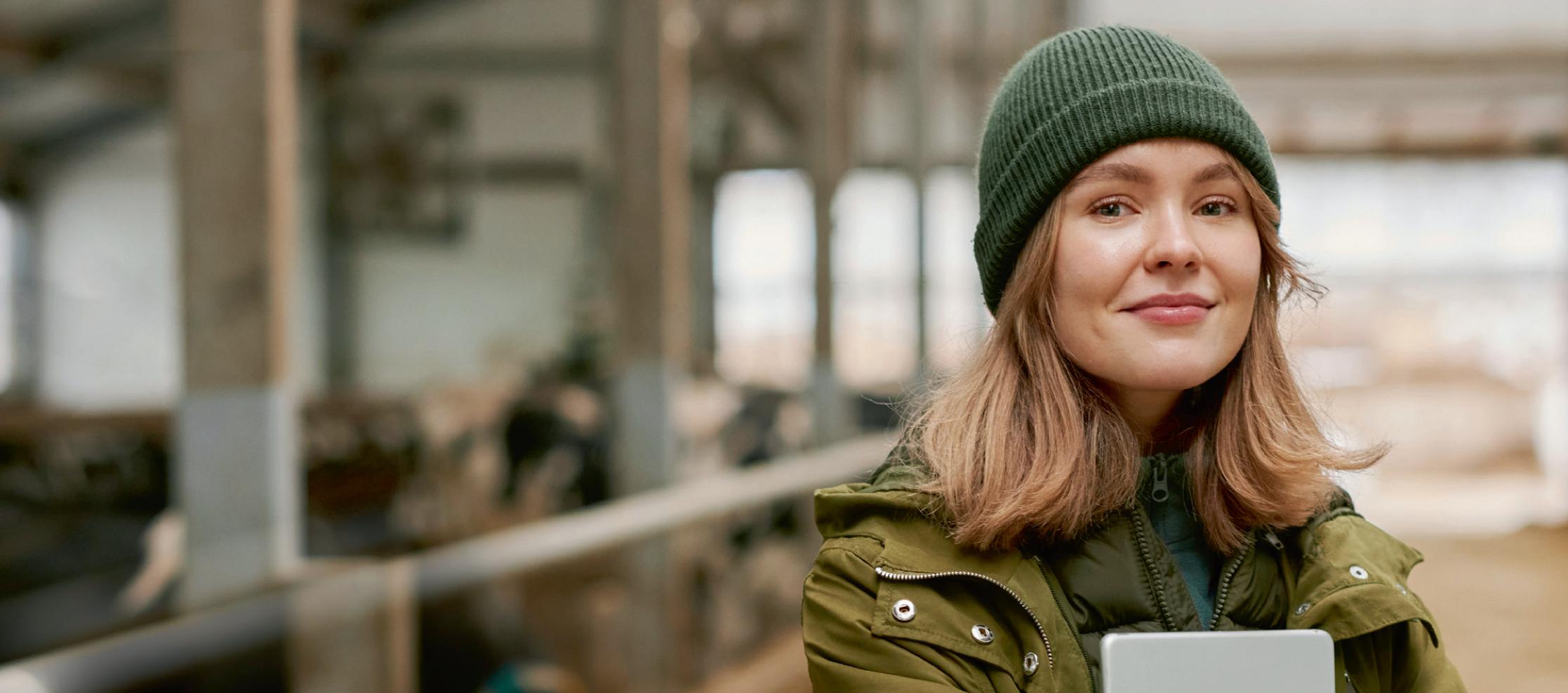

•
•
•
•
•
•
•

www.tiah.org TIAH: the home of skills and careerssupportfor farming andgrowing








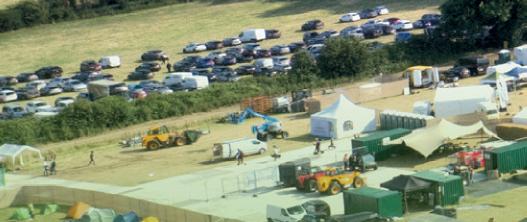
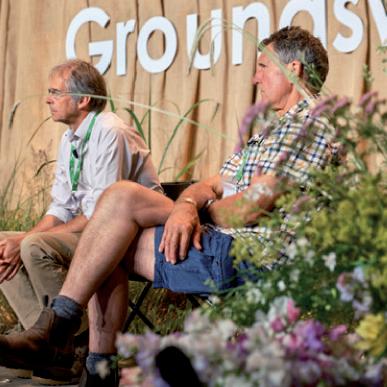













May 2024 36 FREE STUDENT MEMBERSHIP *SubjecttoT&Cs
online learning resources
Access acollection of
Search fortrusted, local training providers
Record and demonstrateyour training records
Increase skills and fll knowledge gaps
Get time-saving tools and templates
Receive personalised learning recommendations
EMBARK ON YOUR CAREER WITH CONFIDENCE Navigating the evolving world of farming and growing is key to asuccessful future. Join TIAH as astudent member todayto: THE REGENERATIVE AGRICULTURE FESTIVAL Lannock Manor Farm, Hertfordshire 26th - 27th June 2024 Tickets go on Sale 22nd April at 10am GROUNDSWELLAG.COM “BY FARMERS, FOR FARMERS” rksh Musi with SWELLAG.COM + Speakers, Seminars, Workshops, Safaris, Exhibitors, Demo’s, Live Music and Bars open late Camping over three nights
Plan your futurecareer
The path to biomass production
Will Rowe is a Student Advisory Member on the Envirocrops project, responsible for enhancing development and broadening awareness
Envirocrops, a three-year governmentfunded initiative spearheaded by the Agri Food and Biosciences Institute (AFBI), Crops for Energy, NFU Energy and software developer Calvium, aims to boost sustainable domestic biomass production by funding innovative solutions that tackle barriers to feedstock production.
Q What is your background and how did you become involved with Envirocrops?
A: I have always shown an interest in farming. Not growing up on a farm means I’ve gained experience in other ways, through associates, magazines and online. I’ve been a member of Windsor and Maidenhead District Young Farmers Club for four years and serve as vice-chairman. I’m currently in my first year of a Level 3 Agricultural Diploma at the Berkshire College of Agriculture and applied for the role of student adviser to sit on the committee after first hearing about Envirocrops during a talk at the college. I have been in position for four months and thoroughly enjoy it.
Q What are your responsibilities?
A: I participate in the Envirocrops Advisory Group’s online meetings, test the web app and the ‘Cropper’ game and provide feedback on its content. I also share information on Envirocrops with fellow students, my Young Farmers Club, and the wider agricultural community within my area. Being a younger member helps to futureproof Envirocrops for the next generation of farmers and landowners.
Q What are some of the most promising applications or uses for biomass crops that you’ve explored during your involvement with Envirocrops?
A: I believe there are no bad applications or uses for biomass crops as all are with the intent of lowering carbon emissions, fighting the climate
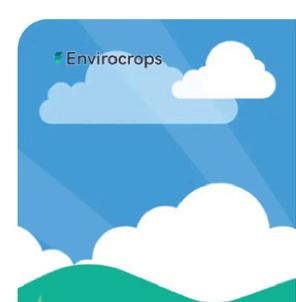
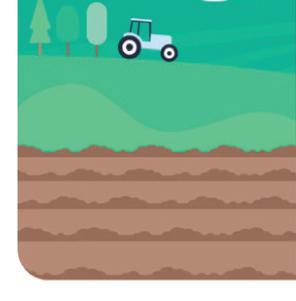







‘Cropper’ encourages players to budget costs while harvesting biomass crops
crisis and providing more sustainable ways to power and heat our homes and businesses. As well as this, it provides farmers and landowners with the opportunity to diversify their income, exploit marginal land and increase their biodiversity.
Biomass crops are not just used to produce energy. Alternative uses include flood mitigation, increasing biodiversity, natural filters and building materials.
QHow do you promote awareness of sustainable farming practices, particularly those related to biomass crops?
A: Young Farmers allows me to network with a wide range of people from arable, livestock, poultry and mixed farms, as well as large estates, ground management specialists and contractors.
As my college has a large coppice willow plantation on a four-year rotation that feeds its two biomass boilers, I have regular meetings with the college’s estate
manager in which we discuss biomass crops and the Envirocrops web app. This also gives me a greater understanding of biomass crop production in my area.
QWhat advice do you have for anyone interested in getting involved in similar sustainability projects?
A: Keep up to date on current changes in the industry, be open minded to new ideas and willing to learn wherever possible. Every day is a learning day! Also, network with farmers and landowners, discuss what they are doing to provide a more sustainable environment.
We are the future of agriculture in Britain and responsible for creating a sustainable future not only for ourselves but everyone we provide food for.
You never know when the next opportunity will arise so make sure you take them when you can, as well as enjoying what you do.
Visit envirocrops.com for more.

Q&A
May 2024 37
Sign up
IT’S FREE YOU SAY?
NFU Student & Young Farmer membership is free to students and young farmers. It allows you to have a say and to contribute towards the future of agriculture, and you will benefit from access to experts in food and farming policy, plus bonus perks.
Join the largest and most influential farming association and receive:
• Student Farmer magazine and British Farmer & Grower or Farming Wales magazine delivered to your door
• The latest news and briefings from our policy experts in NFU Bulletin and sector-specific and regional e-newsletters
• Discounted member rates to attend NFU Conference and other events
• Access to members-only content on NFUonline with a unique login
• Welfare of Animals in Transport test for £42 (+VAT)
• Up to 15% o airport parking and hotels with APH
• Save an exclusive 20% online with Sophie Allport
• 10% discount on Lantra's agricultural health and safety e-learning
• Huge savings on Merlin Entertainment (Alton Towers, Thorpe Park and more)
• 25% o ATV helmets and safety clothing from Spada
• Free debt advice from PayPlan.











































































Follow us on social media @studentfarmer SCAN THE QR CODE TO JOIN or visit nfuonline.com/student or call 0370 428 1401 SIX REASONS TO JOIN It's open to all students and young farmers, 30 years old and under Keep up to date with a unique login to NFUonline.com and NFU newsletters Student Farmer and British Farmer & Grower or Farming Wales magazines delivered to your door Discounts on WATO test, Spada, Merlin Entertainment and more Invitations to NFU meetings and discounted rates to NFU Conference Have your say and contribute towards the future of British farming! The magazine for young farmers September 2023 S&YF AMBASSADOR TAKEOVER EDITION PLUS… KALEB COOPER We catch up before he goes on tour From ambassador MENTAL HEALTH Tips to help yourself and those around you January 2024 Forging ahead Daniel's blazing a trail in the ancient art of blacksmithing MENTAL HEALTHStriking a balancehealthy as a new entrant toforprepare ajob interview Farming for the future From succession to diversification Farmer Will Meet TikTok and Love Island star Will Young Low carbon sheep Go behind the scenes of an industry-wide project CLASS OF 2024 Meet the new Student & Young Farmer Ambassadors May 2024 38

Moreton Morrell
Saturday 15 June 10am - 2pm






po stgra du at e co urs es at sc otl and’ s ru ral co ll eg e SRUC is acharity registeredinScotland: SC003712 FUR THER YO UR CA REER OPPO RTUNIT IES Find us on Facebook Fa www.sruc.ac.uk/postgraduate @srucstudy @sruc























































































































































































































































